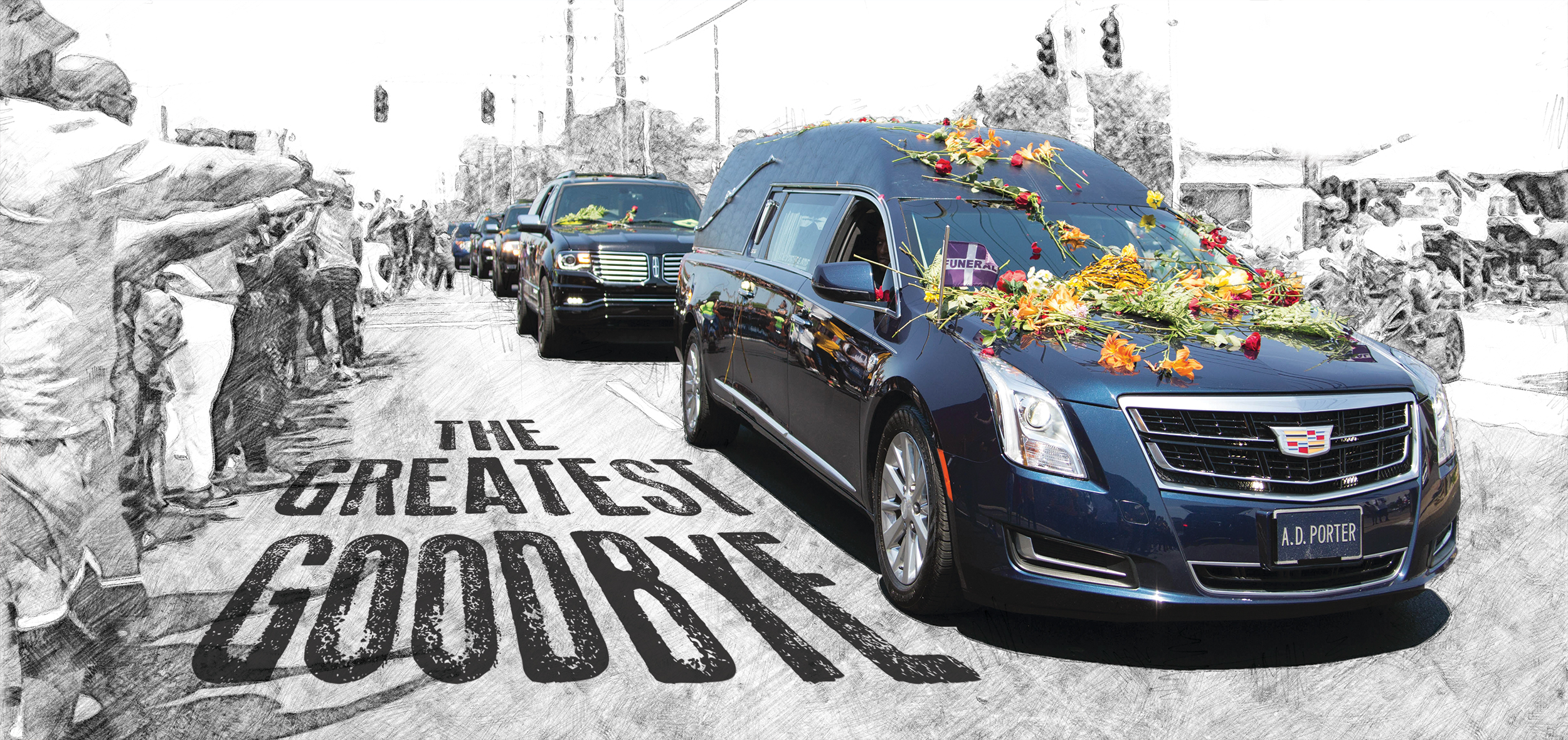
Interviews by Mary Chellis Austin, Dylon Jones, Jenny Kiefer, Anne Marshall and Josh Moss
Originally published in the December 2016 print issue of Louisville Magazine
Do you have a memory or story from the day of Ali’s Louisville funeral? I’d love to hear it: josh@louisville.com
— Josh Moss, editor, Louisville Magazine
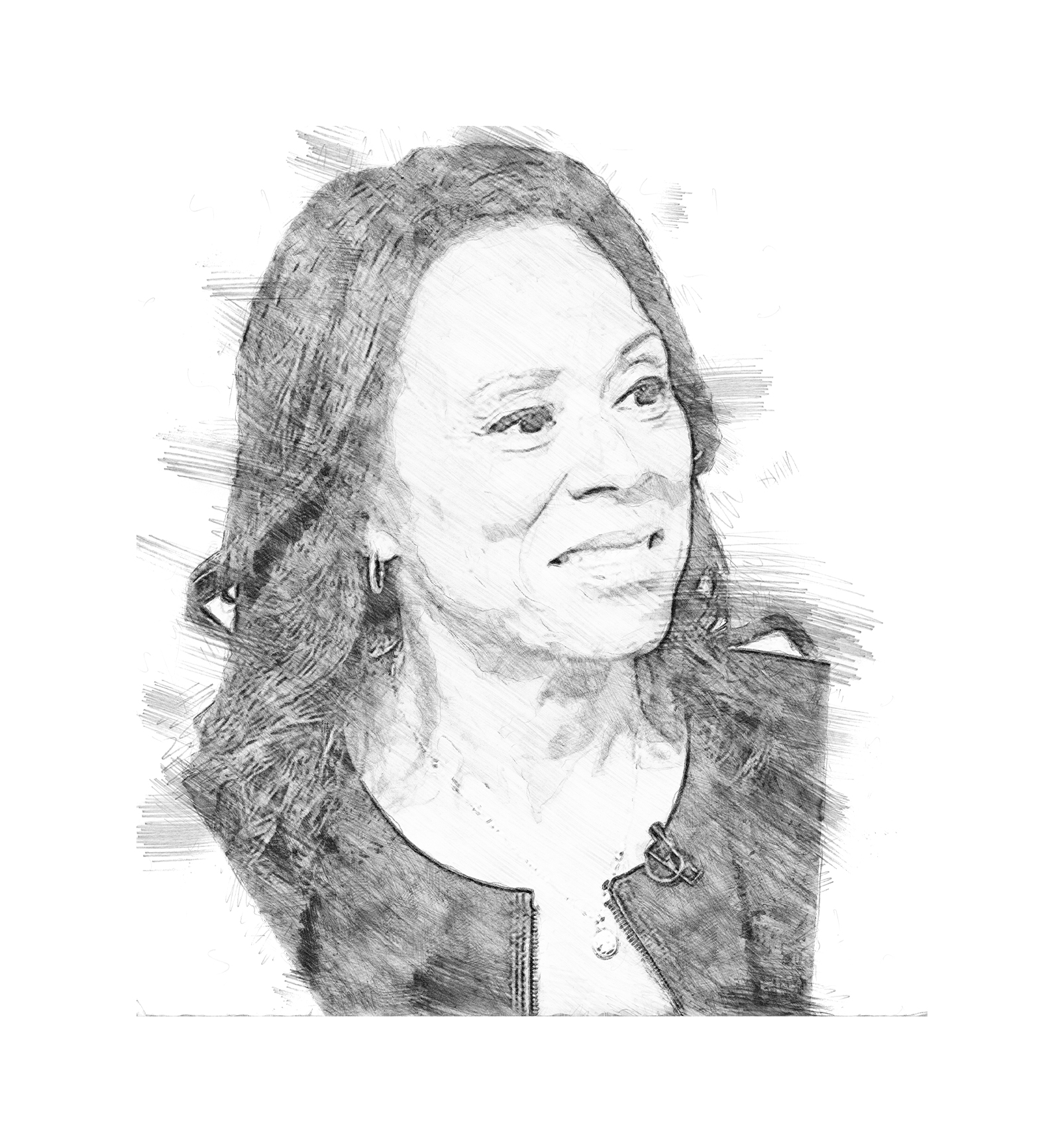
ALI’S WIFE
LONNIE ALI
“Needless to say, I was shocked. I tried to keep myself busy with Boxcar (public relations), planning everything. That was by design. I had to be strong for the kids, for the public and for Muhammad. The final trip home, I thought, He’s where he wanted to be.
“I remember going home in the evenings and turning on the news and it was filled with people from all over the world going to pay their respects at the Ali Center, this memorial growing by the hour. It was huge. It was overwhelming. Then tickets to the service became available and the line was so long it zigzagged across the steps of the Yum! Center, down across the bridge into Indiana. People called me because they couldn’t get flights. I didn’t know what to expect. I knew people would come. I did not know how many people would come.
“When I say he was pulling the strings, I mean from heaven. From up above, Muhammad was orchestrating all of this. He said he wanted his memorial to be in a stadium or an arena. I thought it sounded ridiculous at the time, but he said, ‘All my fans will come.’ He was right. Even the attorneys who had been with us for 25 years didn’t realize how big this would be. Muhammad said it was going to be standing room only, only he meant the whole city, not just the Yum! Center.
“We decided to add the procession. We wanted people who were not able to attend to be a part of it. He belonged to the city and wanted them to say goodbye. Everybody — every walk of life, every color, every political persuasion, young, old — joined together happy and waving. People in their chairs with signs and flowers. One little boy ran aside the motorcade. He must have been eight or nine. I thought, Oh, my gosh, this child really understands who Muhammad is. It was sad, but it was joyous. It gave Muhammad’s family — his children who were not raised here, his grandchildren — the opportunity to see how their father affected the lives of so many people. And the service itself was perfect. It was just the way he wanted it. If I took what was in my head, that was it. Not just for Muhammad, but the way it brought people together. I will always be indebted to the city of Louisville. I will always be indebted to Greg Fischer.
“I should have known how big it would be. It still surprises me. I think we’re normal. We live like anybody else. Even though he loved being a celebrity — if anyone was meant to be a celebrity, it was him — we didn’t live with bodyguards or pomp and circumstance or an entourage. I shopped, I cleaned, I took out the garbage. We were raised in Louisville, Kentucky. We are Kentucky. Kentuckians are grounded people.
“It showed Muslims around the world and in America, but especially in the Middle East, that this Muslim American who was black was honored in a way that probably no one else was honored in the U.S. because of how he carried himself, always doing good deeds. Muhammad never shunned anybody — I do mean anybody. Not that he approved of everything someone does.
“I had a call from President Clinton a few weeks later. He was calling to check on me. He said, ‘I don’t think I’ll ever attend anything like that in my life — I don’t think I’ve ever attended anything like that and I don’t think I’ll ever attend anything like that again in my life.’ Muhammad affected one person at a time. He opened his heart and loved each and every person he met. They knew it. People knew it.
“Afterwards, I jumped into things to distract myself. But I’ve had time to think. The kids and I have difficult days but we get through it. It’s lonesome, that’s obvious. This Saturday, Nov. 19, is our 30th anniversary.
“Nobody knows me. I am under the radar — I like to be under the radar. But people have stopped me in the store and on the street and they say, ‘Can I give you a hug?’ and I say, ‘Of course you can.’ I feel protected and I feel supported. And because of him that’s what’s being extended to me. Because of Muhammad’s legacy, I have to be more conscious of how I respond to and welcome people. I’m a conduit, in a way, for them to connect to him. I have the opportunity to carry it on and carry it forward. It’s his legacy, but it becomes mine as well. Especially now in a country that is so divided, his voice needs to be heard loud and clear. I just wish every day could be like June the 10th. People didn’t care who the other person was. They forgot their differences. I wish every day could be like that.”
— MCA
SPOKESMAN
BOB GUNNELL
Boxcar PR
“W e’d been planning everything for about eight years. As a group, we met once a year, updated plans. These were Ali’s wishes. He sat at the table with us. We were all very uncomfortable talking about his death, but he wasn’t. He said, ‘Make sure the world gets to see me because I’m so pretty. I want to do it in a stadium so all of my fans can say goodbye.’
“Originally, the plan was for him to lie in repose at the Muhammad Ali Center for the whole week. We just so happened to meet the week before he died — before he even went into the hospital — and decided we didn’t want to do that because security would have required us to close the center. On Thursday, the day before he died, I was at a meeting for the Louisville Convention and Visitors Bureau and got a call from Lonnie. We still thought he’d be OK — she thought it could just be a cold — but I had yet to brief the Ali Center about the changes to the plan. We were sitting in a conference room at the Ali Center, maybe five minutes, and my phone rang. It was Lonnie again. She said, ‘It’s not good, you have to come to Phoenix. He’s in organ failure.’
“Lauren Cox from Boxcar, three off-duty Louisville police officers and I flew on John Schnatter’s private jet to Phoenix. At the hospital, the family, all the children, Lonnie — we went into a big conference room and the doctor told us Muhammad wouldn’t make it. The family stayed with him in the hospital because they knew he would make it through the night so some other family could make it to town to see him.
“Matt Lauer is a very good personal friend of the Ali family, so we told Matt what was going on. I reached out to his producer and said, ‘I think I know how big it’s gonna be, but I’m not sure how big it’s gonna be.’ Matt called back and said, ‘Bob, think Nelson Mandela.’
“We were all in the intensive-care ward. All the other patients were moved to the other side, so all of this stuff didn’t interfere. Hana, one of Ali’s daughters, came out of the hospital room, hugged me and said, ‘You need to tell.’ We had a code word: GOAT (greatest of all time). When my staff got the word from us, they did the media release. My phone was blowing up all night long, people calling from all around the world. Right after we made the announcement I got a call asking if I wanted to go on with Matt Lauer. I moved out of intensive care into the hallway, and I looked back through the window at the family gathered around a TV listening to me talking about their dad dying. They were sobbing. (The cause of death was septic shock. — Ed.)
“At one point in Phoenix, I realized I needed to buy a suit for the funeral. Lonnie called me, because we still had to go over some final details, and I said, ‘Lonnie, I’m on my way to Nordstrom,’ and she said, ‘Well, I’m at Nordstrom.’ We met in the shoe department, on a couch, and planned the final details of the funeral. People kept coming up and hugging her.
“I will never forget the call to George Foreman that day to ask him to be a pallbearer. He was too upset. He said, ‘It’s my greatest honor, but I can’t. I can’t be there. I’d cry like a baby. I want to come later and pay my respects privately.’ Mike Tyson was supposed to be in Japan, but he changed his plans and called at like 1 in the morning the night before the memorial service saying he could be a pallbearer. Lonnie and I spoke to him and he was crying and said, ‘I’m gonna be there.’ I called Will Smith and he said, ‘Whatever I have to do.’ At one point, my phone rang with a Hollywood number. ‘Is this Mr. Gunnell? This is Aretha Franklin. You know, R-E-S-P-E-C-T.’ She wanted details about the plans. I said, ‘We were talking about you just last night. You were kind of sweet on Muhammad.’ And she said, ‘Honey, all the women loved Muhammad.’
“The morning we left Phoenix for Louisville, we got to the airport early. The plane we flew back on was actually the San Francisco Giants team jet, which was made available. It was me, John Ramsey, Lauren, police officers, airport workers and people from the funeral home. Some of Ali’s family was already on the plane. We loaded the body onto the plane. What a surreal moment. We knew where we were going.
“Once we were in Louisville, every night after everybody went to bed — so 1 or 2 in the morning — I’d go over to the Muhammad Ali Center for 45 minutes to sit and decompress, to remind myself that it wasn’t about all the celebrities who were coming to town. And there were plenty: Dave Chappelle, Don King, Whoopi Goldberg, Wayne Gretzky, Kareem Abdul-Jabbar, Spike Lee. Despite all that, this was still about a family grieving for their dad and husband.
“Outside the funeral home, after the service for family and very few friends, Lonnie said, ‘Look at all these people around this corner.’ I said, ‘I think they’re just here by the funeral home.’ When we rounded that corner, we had the windows down. All we could hear were people chanting, ‘Ali! Ali! Ali!’ People were lining the highway, standing on overpasses. You’re not supposed to stop on an interstate highway no matter who you are, but the mayor said, ‘You wanna stop, you stop.’ The police stopped traffic for us. The family got out, had time to reflect by the Ali Center.
“The Yum! Center had never seen so many satellite trucks, so we stacked them on the Second Street Bridge. When the memorial service was running long, I texted the networks and said, ‘I’ve got bad news. We’re only halfway there. It may be closer to three hours than two.’ They said, ‘Can you go four? Our ratings are through the roof.’
“After everything was over, Laila Ali’s husband, so Muhammad’s son-in-law, came to me and said, ‘Our children knew Muhammad as their grandfather. They didn’t know him as this big celebrity. Now they know what it was like.’”
— JM
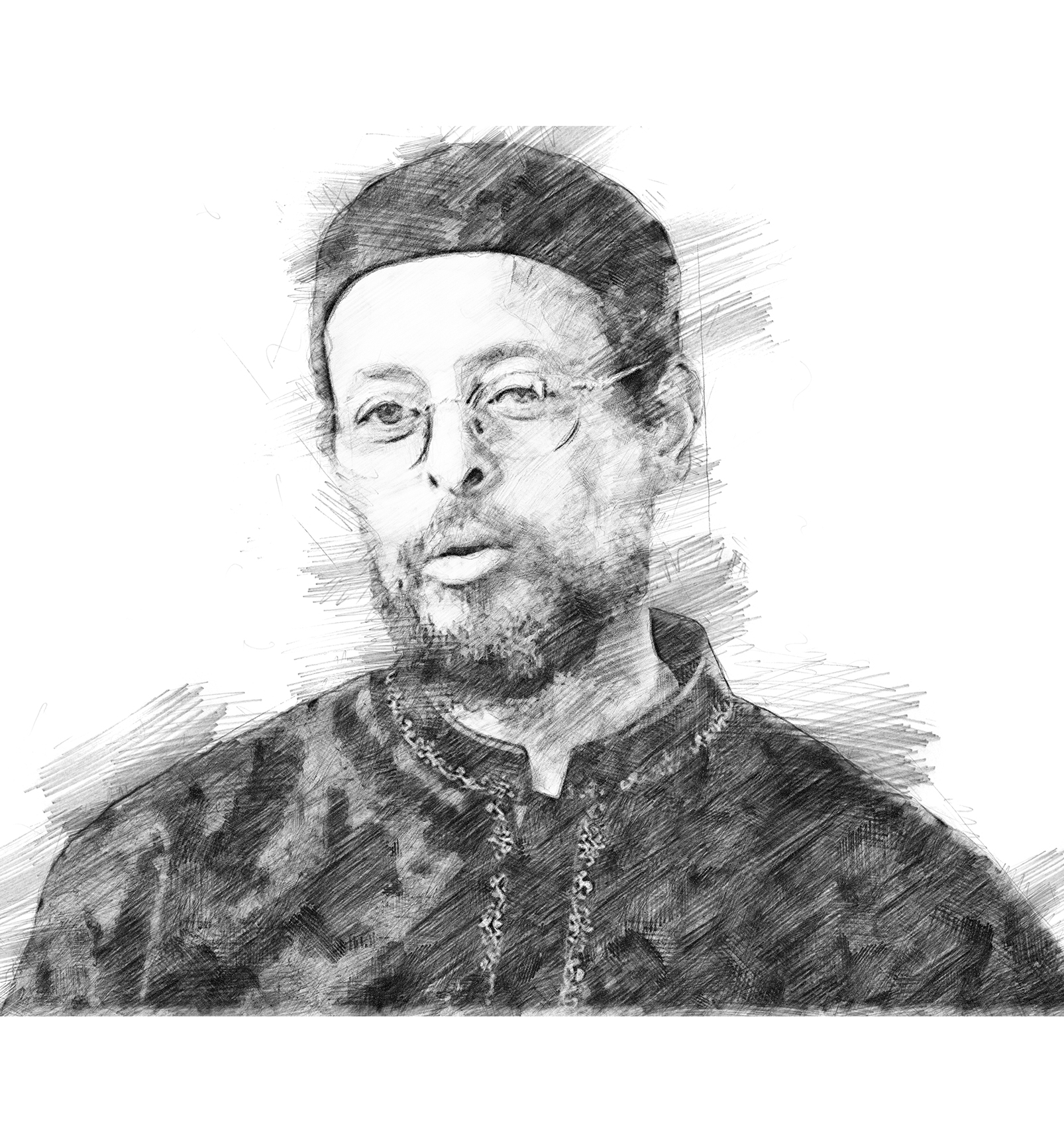
IMAM
ZAID SHAKIR
“Muhammad Ali wanted everything to conform with Muslim tradition and be consistent with Muslim law, and about seven years ago my friend, the Muslim scholar Timothy Gianotti, and I met at the Ali home in Louisville for two days with Lonnie and the legal team and Muhammad, who at that point had difficulty talking but was definitely still in command of his mental faculties. I wrote him a couple poems that he really liked. (Shakir read them at the memorial service. Example: “If reindeer could box he would have whooped Donner and Blitzen, if presidents could fight he would have whooped Richard Nixon.” — Ed.) If there was something he wanted to communicate and couldn’t say it, he was able to write. Actually, we went to dinner and he drew me a picture with a marker on a cloth napkin of a chain of snow-capped mountains.
“We knew from the media that Ali had been hospitalized, but he had been hospitalized several times over the last few years — pneumonia, this or that. We figured he’d get out and be going home soon. But we got the call that he wasn’t going to make it. OK, now this is no longer a plan. This isn’t just something on paper. I’m in Oakland, and when he did pass, I was able to get on the first flight to Phoenix and go to the hospital and spend the last hours with Ali and his family. He was still alive, via life support, for about five hours after I got there. My role was just to comfort Ali and surround him with encouragements, to read the Quran, comfort the family. It was a serene and spiritual environment for his transition from this world to the next.
“I was right there at his bedside when he passed. In fact, it was during the call to prayer that he passed. That’s the first thing a baby hears when they’re born. Traditionally, the father makes that call in the right ear, and then a very similar call in the left ear. Those should be the first things a child hears when they come into the world. And that was the last thing Ali heard leaving the world. After he passed, the family wanted me to stay with the body. He’s lying in the bed, and I was always on the right side, so for a lot of that time I’m standing and just holding his left hand — the hand of the famous Ali jab.
“When we left the hospital, we kind of faked the media out, to avoid a circus. The hearse left from a delivery ramp, a back door. I was in the back of the hearse with the body bag, chanting some Muslim prayers. The funeral home in Phoenix was in a more suburban part of the city, with access to plants and wild flowers and the mountains.
“We made sure that in each of the cities where Ali spent a significant amount of time — Louisville, the Phoenix area, Atlanta, the farm in Michigan — that there were teams of people available for the washing and shrouding of the body. The person who washed the body in Phoenix was probably the most experienced body washer in America. He had prepared over 900 bodies for burial. He was a master.
“First we washed the parts of the body that one would before praying — the face and then the arms up to the elbows, then the hair, then the ears, then the feet. Then we washed the rest by pouring water under a set of sheets covering the body, the water running from a hand-held spout like you’d use to water flowers. We scrubbed the body down with a wash cloth, from head to toe. You do that three times, the third time with perfumed water. We shrouded the body in three full-length, sheet-like white cloths.
“On the plane from Phoenix to Louisville, due to a change in the schedule, there was talk about having a private funeral. I just remember pushing emphatically for that not to happen, that it had to be a funeral that was open to the public, large enough to accommodate a large amount of folks. People deserved an opportunity to send the Champ off in an appropriate way. We were able to get the North Hall at the Fairgrounds for the funeral prayer, the Jenazah.
“He was in the hole of the plane, and when the container came down the conveyor, covered in the tapestry with Quran verses, I remember reflecting on the great journey that Muhammad Ali had taken. And yet, in doing everything he did, he maintained what Kipling says in his poem: ‘You can walk with kings and not lose the common touch.’
“The procession through the city is one of the most memorable and moving experiences of my life. Old folks, black folks, white folks, rich folks, poor folks. This isn’t something human beings accomplish on their own accord. There’s something more powerful at work here. Ali was used by God to do some extraordinary things in this world. Ali opened people’s hearts in a way that nobody else on the face of this earth has been able to do, especially in the 20th century. Even in death, to be so alive in people’s hearts — those are the signs of sainthood. The saint lives on in the hearts of the believers.
“I’d been out to the cemetery before the burial to make sure the grave was properly aligned, to make sure it was perpendicular to the direction of Mecca. The preferred practice is that the body is directly put in the ground, lying on the right side to face Mecca, but we arranged all of that in the coffin. Once we were graveside, we made sure all attendees had an opportunity to throw dirt onto the coffin. We said our prayers, and bid farewell to certainly the greatest figure ever to come out of Louisville, Kentucky.”
— JM
THE GATHERING PLACE
THE MUHAMMAD ALI CENTER
“Crazy. Just crazy.” For the 40 employees of the Muhammad Ali Center, that’s the overwhelming sentiment when remembering the week after Ali’s death. Crazy, they’ll say, in a wistful tone, a gentle exhalation to follow. There are other descriptions too — beautiful, amazing. To understand the crazy, absorb the volume: That week the Ali Center credentialed 263 members of the media; 25,000 people came to tour exhibits (the nonprofit museum and cultural center considers 100,000 guests over an entire year a bustling attendance rate); the Ali Center’s website traffic increased 2,200 percent and the center was mentioned in 30,000 stories seen around the world; the retail store recorded 3,329 purchases for a total of $129,308 in sales, compared with 793 purchases and just under $11,000 in sales for the same week in 2015.
12:30 a.m., June 4. That’s when the crazy started. Jeanie Kahnke, the Ali Center’s director of public relations, got the call that Muhammad Ali had died the day before. She activated the Ali Center’s phone tree — the same one used on snow days — to alert staff they must report to work. “Five or 10 minutes after that my phone started blowing up,” she recalls. That week it rarely stopped ringing. Calls came from ESPN and Al Jazeera and the BBC, all the networks, newspaper after newspaper, reporters needing confirmation and quotes. The Greatest was gone. “I heard from a friend who was on a safari in Africa, and they got to their hotel, and it was the only thing on TV,” Kahnke says with a bewildered chuckle.
Soon after news broke of Ali’s death, before the sun had a chance to rise, flowers started popping up around a fountain on the 40,000-square-foot plaza outside the Ali Center. Over the next week, visitors left poems, boxing gloves, pictures, a bee-shaped balloon. “The thing about Muhammad is, everyone felt like they knew him,” Kahnke says. “And even after one meeting, people thought they were friends. Muhammad made people feel like they were friends.” So the Ali Center’s 40 employees worked nonstop. “The thing that kept me going is that I know Muhammad always stayed somewhere to meet every single fan,” says Marissa Franz, the center’s visitor services manager. “Muhammad would’ve wanted us to make sure every fan could pay their respects.”
Even after exhibits closed, employees folded shirts to restock shelves cleaned of merchandise several times a day. At one point during the week, Franz ran out of shirts. A vendor in Alabama agreed to drive five hours to deliver a new order because shipping would take too long. The center received lots of help that week. Folks from the mayor’s office watered flowers and fielded press calls. Musicians, including Will Oldham and Teddy Abrams, performed on the plaza in tribute. It was hectic. It was lovely. Since the Ali Center opened in 2005, whenever challenges appear, a saving grace swoops in. Some of the employees credit what they like to call “Muhammad Magic.”
No one had time to jot down memorable moments. But some stories remain fresh. Like how that entire week the lobby smelled of fresh flowers. Or how, at first, the center tried to keep track of guests by giving out bracelets. They quickly ran out, so they tried stickers. Those ran out too. Eventually someone just stood at the door with a counter, clicking as each guest arrived. (The Ali Center waived fees that week.) Kahnke likes to share the story of a middle-aged man she met from Australia. He’d never been out of his country, never been on a plane, but when he heard of Ali’s passing, “He just had to come,” Kahnke says.
On Friday, June 10, the day of the funeral, at about 10 in the morning, an exhausted staff gathered on a sixth-floor balcony overlooking I-64. Under a bright sun, they waited to view Ali’s procession. At 10:17, Ali’s hearse slowed to a stop on the concrete ribbon below. All small talk vanished. Perched atop the shimmering, boxy structure that sits on the lip of the Ohio River and appears to lift off to the sky, the staffers looked down and wept. For the first time in a week, they paused. Crazy had put up a good defense to grief. In stillness, loss settled in. “It was like a period to a very long sentence,” Kahnke recalls. After a few minutes, the procession rolled westward. Everyone went back to work.
— AM
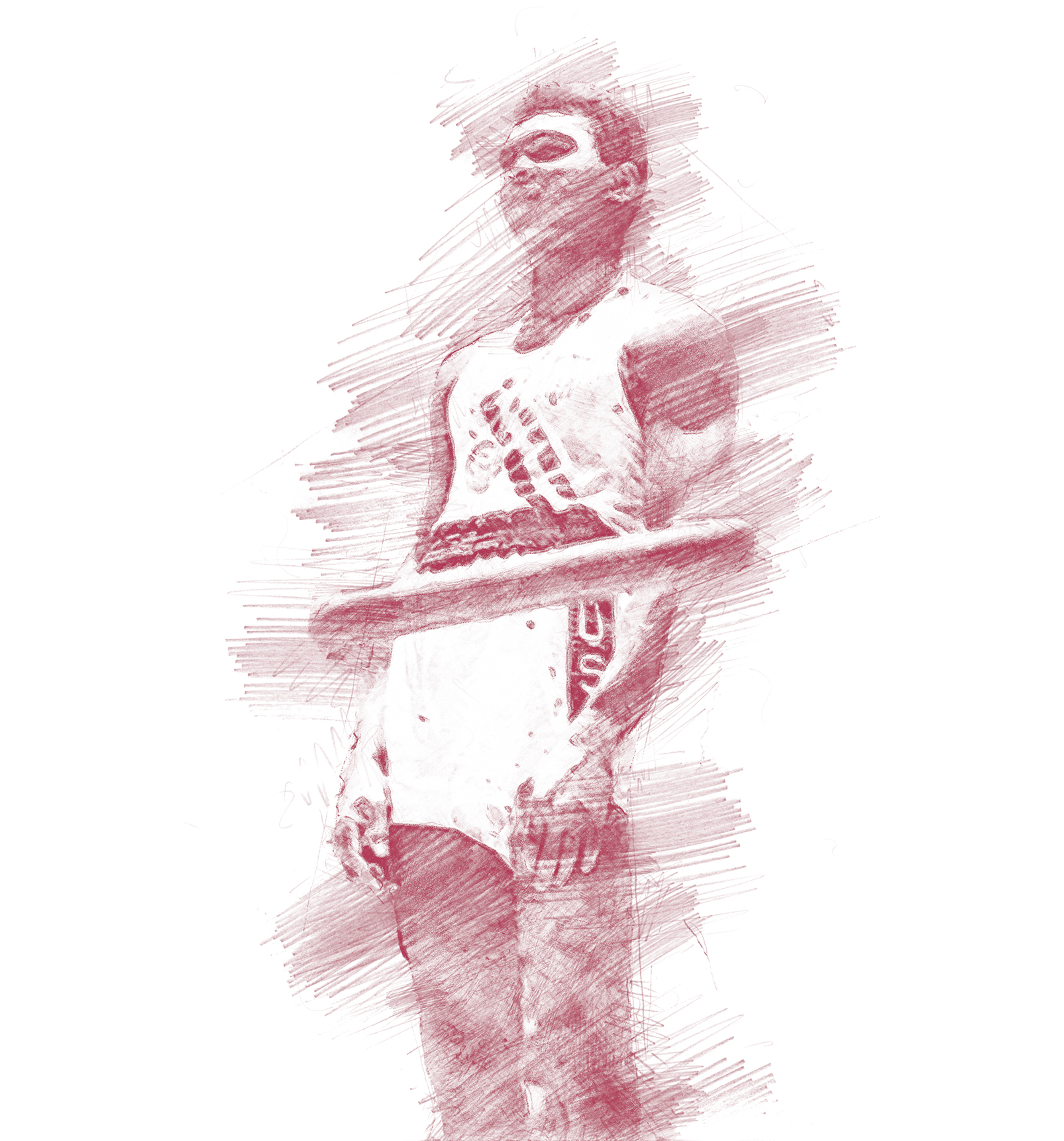
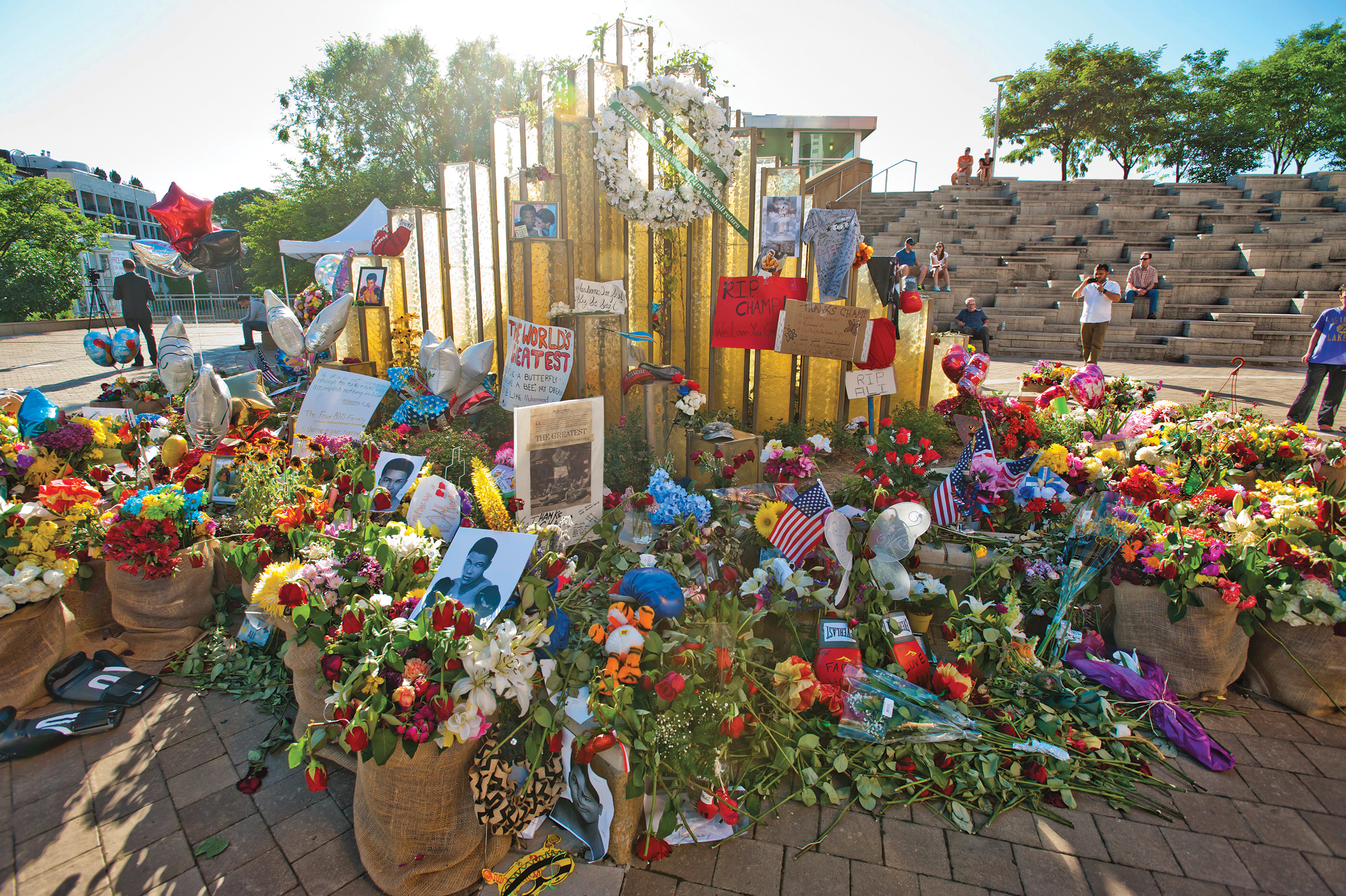

DAUGHTER
RASHEDA ALI
The details of June 3 blur. Mostly Rasheda Ali remembers the sting of grief, dull then sharp from one moment to next. “I never thought this would happen to us. I thought Daddy was superhuman,” she says. “Even though he had Parkinson’s, I thought he would never die. I know it’s silly.” In the Phoenix hospital, she remembers leaning over her father and whispering into his ear, “I give you permission to leave. I want you to stay here but I know you’re struggling.” Then she whispered again, this time a send-off that would make the champ smile if he could: “I know now you’re young and you’re fast, you’re handsome and you’re pretty,” she said.
Rasheda, an author, motivational speaker and Parkinson’s disease advocate, is one of Muhammad’s eldest daughters. The family’s sobs filled the quiet after life support machines were turned off. Then, a peculiar, persistent noise. “A dialysis machine or something,” Rasheda recalls. “It interrupted our crying. It started — ding, ding, ding. And it stopped all of us in our tracks. It sounded like the bell from his fights and we all kind of stopped and froze and we started breaking up laughing. We thought Daddy interrupted us from crying because he didn’t want us to cry. He wants us to celebrate his life and not mourn.”
As Rasheda, her husband and two teenage sons, along with Mike Tyson’s son, piled into a car for the procession, sadness loosened its grip. She couldn’t believe the thousands of people lining the streets, all longing to share in this public farewell. “I’ve never seen anyone with a send-off as beautiful as my dad’s,” Rasheda says. “If you looked at the people, it was exactly what Daddy would’ve wanted. It was every single race, every single religion was represented, every single skin color, every single age. We had tiny babies with Ali shirts on. I saw a man in a hospital gown with an IV — he must have walked out of the hospital and stood.”
Rasheda rolled the windows down in the car to wave and greet her father’s fans. “One person said, ‘Thank you.’ And I said, ‘Why are they thanking me?’ Then someone else said it. And I kept thinking: Why are they thanking us? And I realized they are thanking us because we shared him,” Rasheda says, pausing to sob at the memory. “They were thanking us because we let them borrow him.”
During the procession, Rasheda’s sister, Hana Ali, remembered a story her father would tell. She sent it out in a tweet as the line of black cars and SUVs rolled toward Cave Hill Cemetery: “We just left the funeral home and are in the car now following our beautiful father en route to his final resting place, as his recurring dream is realized. When he was younger he said, ‘I used to dream that I was running down Broadway in downtown Louisville, Kentucky, and all of the people were gathered in the street waving at me and clapping and cheering my name. I waved back, then all of a sudden I just took off flying.’”
Rasheda spotted the tweet later that day. “Chills went down my spine because that’s exactly what happened,” she says. “He was there in the moment, and I believe he flew up to heaven that day.”
— AM
CONDUCTOR
TEDDY ABRAMS
Louisville Orchestra
“W hen Ali died, there was this outpouring of emotion. People were gathering right outside the Muhammad Ali Center, and I thought that using music would help people connect with each other and interpret what has just happened. Or even just something to pay tribute to him in the smallest way. I called my friends Jecorey Arthur, Carly Johnson and Scott Moore. We did a communal singing of ‘Amazing Grace.’ This really brought folks into an intimate space.
“He was definitely a citizen of the world, but Louisville is the basis for his story. He found the resources to become the Muhammad Ali we know him to be in Louisville. We shouldn’t ever forget that. Those same resources, the same ingredients, are there in our city for the next person, the next hero to get inspired to do something truly great. If we don’t provide that legacy or that evidence of those ingredients, we’re doing our citizenry a disservice.”
— JK
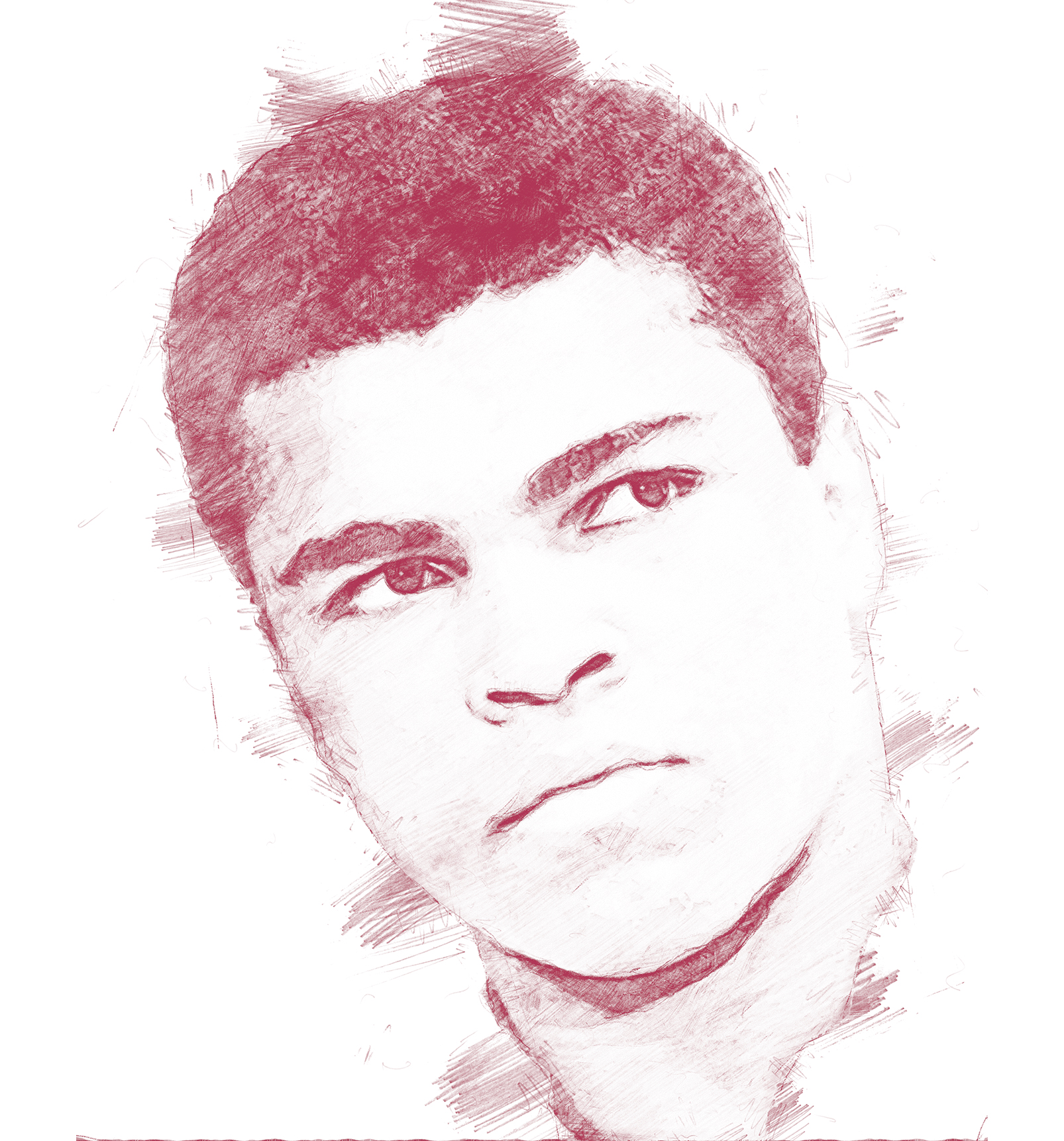
OBITUARY REPORTER
CHRIS KENNING
Courier-Journal
“Every time he got sick, editors absolutely freaked out. They would charge around like, Where’s the obit? We had different content systems over the years. We’d have to find it and there’d be five different versions. Which is the right version? Which one did you update? It was always this panic and would always subside and be fine. I can’t count the amount of times they were like, ‘Quick, get in and make sure the obit’s updated.’ They really wanted to make this the Courier’s story and really do an amazing job with this. He always turned out to be OK. It was nothing serious.
“I remember running into someone from Good Morning America outside the (boyhood) house. They’d just renovated the home. She was like, ‘Well, they sent me down here just in case.’ We had heard that this was really bad, that he may die. Then we heard a rumor that he had died. Boxcar (public relations) gave us this sort of off-the-record statement and said they were going to officially announce it at a certain time — I think they said 11 p.m. But they didn’t. Time was ticking by. I was trying to make the story sound as dire as I could.
“I think it was at 12:18, we got the confirmation and everybody’s like, Oh, my God! Put a new top on this and switch out that story and put the obit in. I’m picturing the photo in my mind — the newsroom, late at night, looking over proofs. It was literally a newspaper movie. We’ve gotta hit the presses at 12:30. Quickly! Quickly! — this crazy, last-minute scramble. Everybody was there. Every editor. It was kind of like election night. Not every reporter was there, but probably half. All the digital people had to be there. I was terrified that, one, I would make a mistake. Imagine making a mistake in his obit. Or, worse yet, run a story that says he’s sick and then at 1:30 in the morning they say that he dies.
“The obit was something I tended over the years. I would have to look at it and look at our archive and search around to see what had happened since the last time we updated it. ‘OK, maybe the home has been bought, let’s put that in there,’ or ‘He last appeared at this charity event two years back.’ But it was mostly C. Ray Hall, who had written it years ago. Must have been weird for him to have done all this work. And really a lot of people did. When you saw the special section we published, it was a lot of names of people that aren’t there anymore.
“By 10 o’clock, probably every major news outlet knew, but nobody reported it. How many journalists knew that he died? I don’t know if it was respect for Ali — obviously a ton of people knew when he died, but nobody said anything. Which I think is powerful in and of itself.”
— MCA
THE YUM! CENTER
DAVE ARNOLD
box office director
SANDRA MORAN
marketing and public relations
Dave Arnold: “We expected a full house, whatever a full house was gonna be for a memorial service, which we had never done before. The only building in our company that had done anything like it was the Staples Center for Michael Jackson’s funeral.”
Sandra Moran: “The family wanted tickets for local people.”
DA: “You couldn’t get them online, couldn’t call in and get them. You either had to go through the family or stand in line. We let people start getting on åthe property at midnight. You couldn’t camp out, but people were waiting two days before. We couldn’t keep up with the phone calls. There were a lot of people who felt like they were VIPs, or they were traveling from out of state or out of the country. ‘How am I gonna get in? I already have my plane ticket.’”
SM: “A few days before people were sitting across the street in chairs. I learned quickly that I couldn’t wear my KFC Yum! Center badge while walking downtown because would come up and ask for tickets.”
DA: “I got here at 6 or 7 in the morning, and as I was getting off I-64, the line was already wrapped around the building. I’d never seen a line around the back of the building. We had every window open across the front 10 windows. We gave out over 10,000 tickets. Including tickets from the family, stuff like that, about 15,000 people total came.
“Some people tried to sell tickets, but the family had StubHub and Craigslist — all the resale sites — take them down. I’m not gonna say all the secondary markets, but the major secondary markets, in honor of Ali and the fact that it was a memorial service, did not allow people to sell them.”
SM: “There were parts of the arena that even I was not allowed to walk into. It was unlike anything we’ve ever dealt with, to have that number of foreign dignitaries and politicians and celebrities all at once.”
— JM
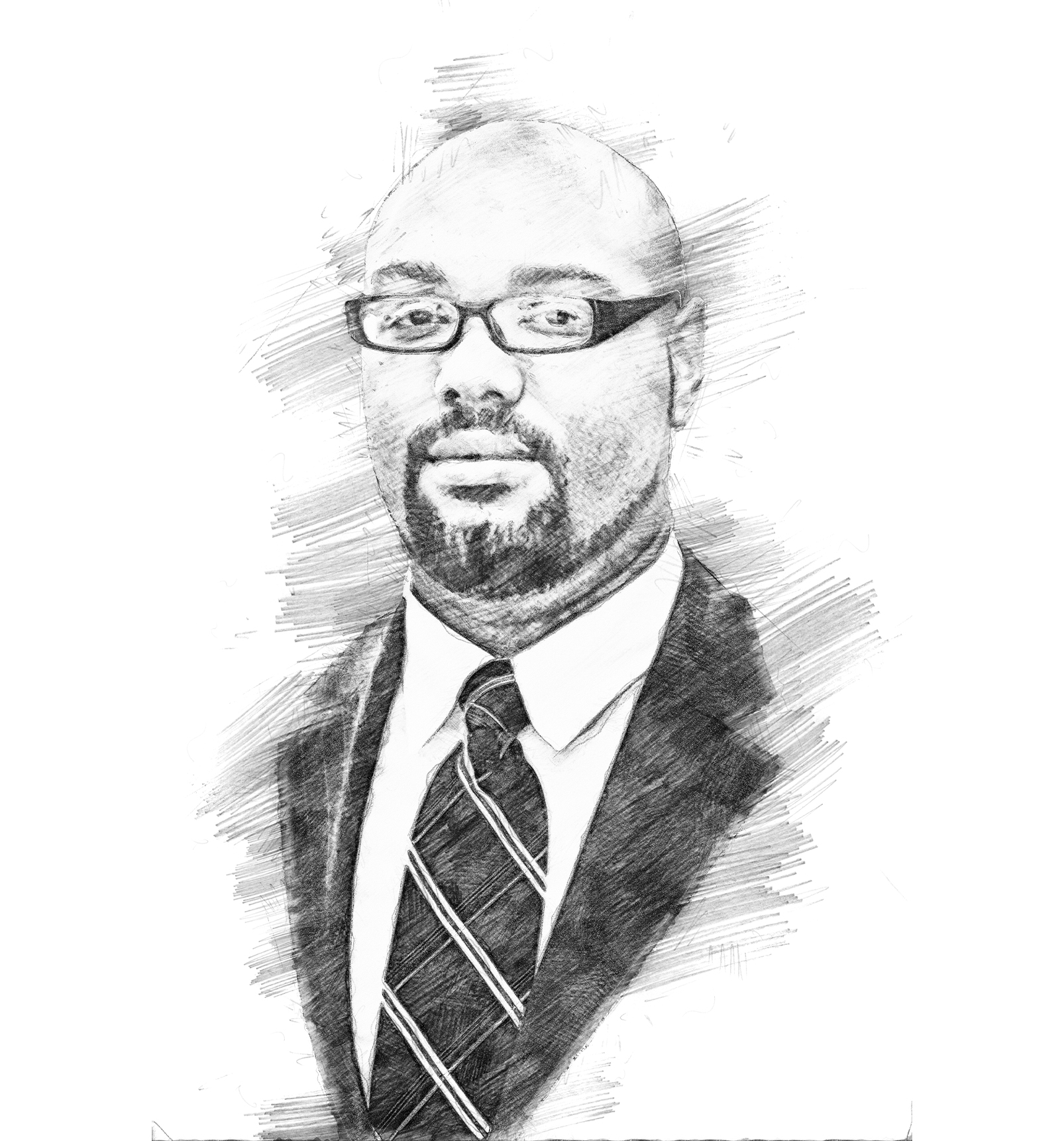
HEARSE DRIVER
CHASE PORTER
A.D. Porter and Sons
“Albert Logan was driving the hearse to the airport and from the airport to the funeral home. I was riding with him, and he backed it up to the airplane, and I got out and made sure the locking mechanism was on the body so it didn’t rattle in the car. All these helicopters are around, and all this security. We peeled out of the airport. You’re on the expressway, and you get off on Bardstown Road going to the funeral home, and now people knew what was going on. News travels so fast. People were on Bardstown Road by the Rally’s, by the Thortons, by everywhere, and they’re standing. And we had police escorts and whatnot, but this was already like a parade, like a New Orleans funeral.
“At the funeral home there are some preparation tables, like from mortuary science. Those are stainless, and you have a counter — it’s a preparation room. The tables are on wheels, pushed aside. And then you have the Champ, just there in his casket. He was in a locked location, so nobody could get in there except for a few. The code on the door was changed just for that. There were police in there, sheriffs, and officers maintaining the grounds the whole week because people would come to take pictures and stuff like that.
“I knew I’d be driving the hearse, and by Friday morning, I knew it was going to be a lot of fanfare. The hearse was at our downtown location, and we got there early, around 7, to make sure the car was nice and cleaned off. Ron Price, he was like my copilot, right there with me the whole time. We drove out to the funeral home, and of course we got there before 8 and it was already a circus. Helicopters. Traffic. But then it just became more and more and more and more. And then, as the family arrived, it was really wild. I was kind of calm on Friday because Thursday I had to drive the body from the funeral home to the Fairgrounds, where they had the prayer service. Getting the body out, taking it in the arena, bringing it back out to the hearse, driving back to the funeral home — it was kind of like a rehearsal.
“Friday, we got to the funeral home, and the pallbearers and everybody come in. Mike Tyson, Lennox Lewis — like, these are names. We got the pallbearers on either side of the casket, and we wheeled him out to the car. They had put these black curtains on both sides of the carport at the funeral home, so it was very dark — you couldn’t really see. There were so many helicopters flying around. By this time, people were everywhere all around the funeral home. Everybody was kind of respectful, nobody was acting crazy. This is what America is supposed to be about — it was all sorts of different people there smiling, high-fiving, shadow boxing.
“I always had someone in front of me, so I never had the opportunity to actually dictate the pace. I was just driving. That really allowed me to soak in the moment a lot more. I remember, we kept joking during the procession, ‘Ain’t nothing gonna top Bardstown Road.’ And it’s like some comic strip. You get to the next spot, like, ‘Nothing’s gonna top that.’ I remember people going south on Bardstown Road, them stopping. And so then you have traffic backing up. I remember people rolling down the window, screaming, ‘Yeah! Yeah!’ And then, going down Bardstown Road, people were everywhere. Where did these people park? It was just people everywhere, people with different flags, people with signs they made, people shouting, tossing flowers on the hearse. When we got on the expressway, the flowers all kind of blew off. I remember feeling relieved about it. I was able to see for the most part, and then, once the flowers got to be so much, the wipers didn’t work anymore. The flowers were too heavy for the wipers. We go past the Newburg Road exit, and there are people on the overpass stopping, watching. That moment was like the O.J. Simpson chase. They blocked the entrances to the expressway, but people going the other way are stopping.
“Right as we got off the interstate there, at Ninth Street, you kind of go down, and it’s like, all these people. I remember Ron and I just like: ‘Do you see this? Are you kidding me?’ You heard people scream and yell and shout, and everybody was singing and happy, you saw some people crying — but it wasn’t a sad moment, it was totally incredible. Then flowers were just going, and we were like, ‘Raise the windows up!’ Because they were flying in. These were like torpedoes or something. They were in the floorboards, on both sides. As we were riding, people were just tossing, and they wanted their flower to stick.
“We got to the childhood house. People were so close, they were brushing the side mirrors. People were smacking the car. At the same time, people were kissing the car, just wanting to touch it. You saw people running up to the car. All the while, people were throwing flowers on the car. Once we got a few houses down from his home, the cops moved away, and we were able to pick up speed again and get back onto Broadway. And then it was mass hysteria. By then, the flowers were too heavy for the windshield wipers again. It was like a veil over your eyes; you can see, but you can’t see.
“We finally got to the cemetery and all the people disappeared. It was like out of a movie, like the character just woke up in dreamland, like you blink and you’re in another place.
“There’s like 6 billion people in this world. How much of 1 billion saw a picture or a clip? How many people know that happened? How many people saw that picture of the hearse with all the flowers on it? I can never forget.”
— DJ
THE VISITORS BUREAU
STACEY YATES
Yeats is VP of marketing and communications at the Louisville Convention and Visitors Bureau
“I was so proud of Louisville. I thought we were one idiot away from an international incident, from someone throwing a tomato on the casket. It’s not surprising but refreshing that Louisville came together and shone at that time.
“I’ve stopped at Cave Hill — I live in the Highlands — at least a dozen times since. I monitor the interest. People leave coins, mementos, flowers. People have been leaving honey. There are 150 people on average daily.
“We’re promoting the idea of Ali tourism. Sort of what Minnesota is building with Prince and what Memphis is doing with Graceland. It’s hard to think of someone who has garnered this much international attention. In our lifetime, Princess Diana and Mother Teresa come to mind, but neither has a specific place for people to visit. What’s unique about Louisville is the capacity to host — I don’t want to call it a pilgrimage, but it’s like that. Ali is a big topic of interest when I go to trade shows in London, Berlin, Dublin. Internationally, people always asked (about him). Domestically, I think a lot of people were surprised he was from Louisville. Ali had a vision to build his center. Then you have the boyhood home. The third leg of that stool, Cave Hill, is already on the National Register of Historic Places. Central High School, the Smoketown monument — we haven’t stopped, basically.”
— MCA
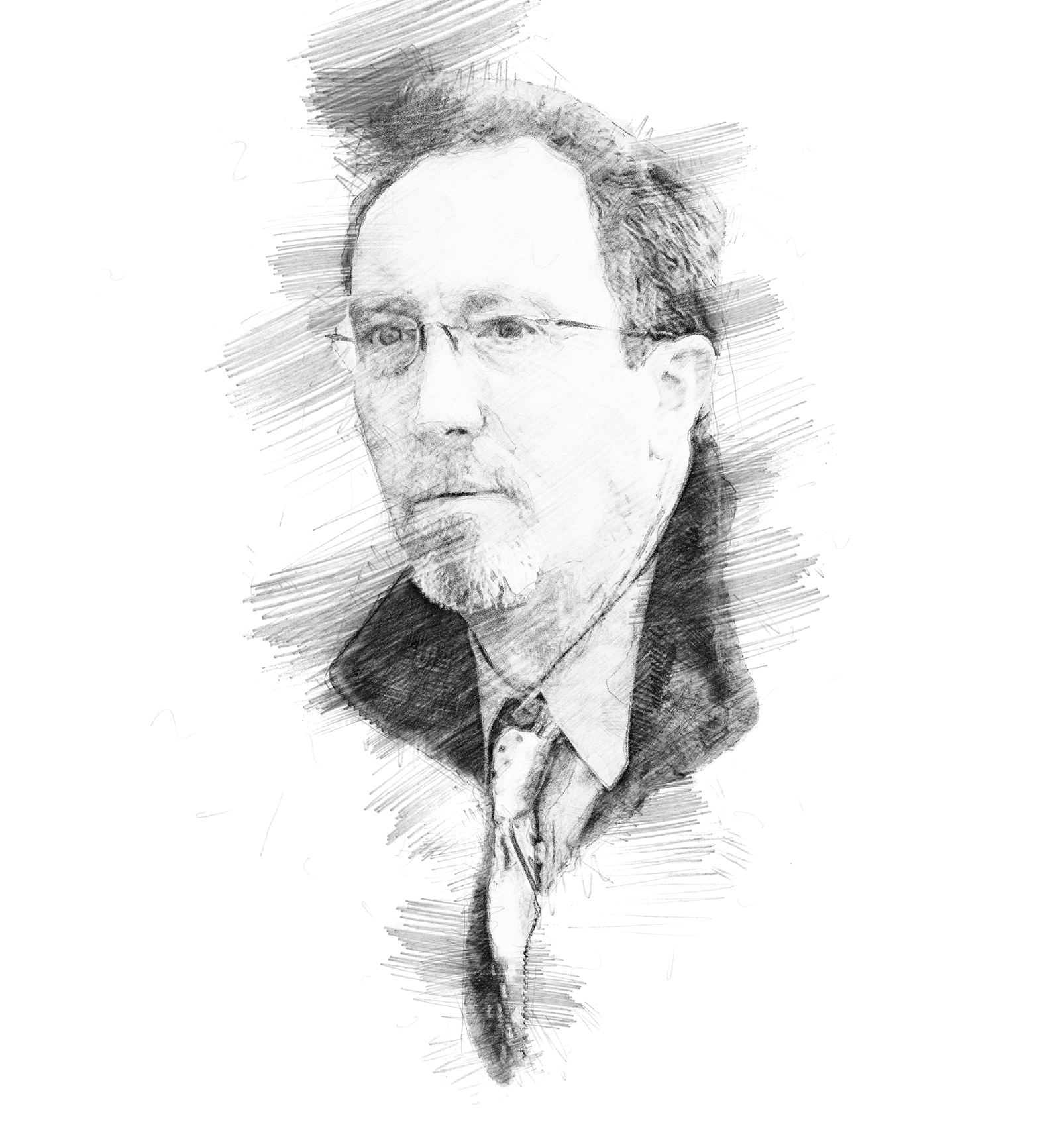
PHOTOGRAPHER
MICHAEL CLEVENGER
Courier-Journal
“I got a call from my boss that was like, ‘Right now, it looks like you’re gonna be in the motorcade, and for the time being keep it to yourself.’ So I didn’t tell anyone. I didn’t tell my wife for at least a day. But it was a matter of realizing what that meant and the importance of it, because I knew there was only going to be one of me.
“I felt a little bit of pressure getting into the back of the SUV because I was really there to do a job for everyone and I didn’t want to mess up. I was in what they call a pool situation, so any photos that I shot were going to be shared with anybody who wanted them. I think the Associated Press picked them up. And then I have no idea how far they were distributed after that. I found the photos in multiple outlets around the world. And that truly was humbling. Humbling to be asked to do it, to be relied upon to do it.
“The very first time that I saw somebody walk out and touch the hearse I thought, oh, this is not gonna go well. And nothing happened. The next time that somebody came out I thought, OK, we’re probably OK. A few people reached out and kissed the hearse. What surprised me the most was how everybody was on their best behavior. You have that many people gathered at that many places waiting that long just to catch a glimpse or to wave a sign or to see the hearse go past that I thought, well, something will go wrong. At the end of it I remember exhaling and thinking: what a wonderful day in Louisville.
“I think it had the elements of pride, respect, love, admiration and all of those feelings were in each flower that hit the windshield and each petal that was laid out at Cave Hill Cemetery. And every sign that they waved and every person who touched the hearse, that’s what they were infusing back into that car and back into Ali. What he gave to the city, the city gave back.
“You can argue that Louisville’s day every year is the Kentucky Derby, the first Saturday in May. That’s a Louisville day, but this may truly be the most Louisville day ever.”
— MCA
CURATOR
JECOREY “1200” ARTHUR
A musician who organized the talent for the I Am Ali celebration at the Kentucky Center the Wednesday after Ali died
“Forty-eight hours before the I Am Ali event, I got a call from the mayor’s special-events team saying they wanted me to help organize performers to appear. Ali was Ali. A lot of people wanted to be a part of it in any way, shape or form. I just helped move the chess pieces in the right place.
“I thought of some of the music that Ali not only liked but also made — he was a musician, a poet; a lot of people didn’t know that. I thought of those things — spoken word, blues, jazz, gospel — and I just reached out to artists who embodied those genres, that characteristic, that style. And also people who were geographically relevant, from west Louisville. Those kinds of artists who would never otherwise get to participate at an event at the Kentucky Center or with the Ali Center or with the mayor’s office. And I said, here they are — these are the people that grew up where Ali grew up. These are the people who created music that he enjoyed listening to. We put them on a stage and they played their hearts out.
“My grandfather used to eat lunch with him. They would eat fish in some random park. For me, Ali was the first superhero that I saw, looked up to. Before that it was like Power Rangers, Barney, Ninja Turtles, but this was an actual human being and he was from where I was from — west Louisville. To live in a place where there’s obvious segregation, there’s obvious prejudice, it was a really nice nod to see that those things can be broken down. Even though it was only temporary, it’s nice to see that that’s what we could have and what we will have if people live life the way that Ali lived life — if people persevere, love each other, respect each other. It’s possible and I’m glad that his death showed that. I just hope that we work harder to have it more than just temporarily.
“I also performed at the Muhammad Ali Humanitarian Awards (in September) with (Louisville Orchestra music director) Teddy Abrams. Just being in that room with people who are working so hard to make this world a better place — who live in that temporary realm of peace and love and happiness and all the principals that Ali had — it made me feel like I need to do that 24/7 and never let down, never slack or feel weak, never feel like I can’t always be that superhero for someone else.”
— MCA
THE CHILDHOOD HOME
GEORGE BOCHETTO
co-founder of the Muhammad Ali Childhood Home Museum (3302 Grand Ave.)
“Muhammad Ail cherished his Louisville and Grand Avenue roots. (During the procession), to say that people were passionate is probably an understatement. A lot were from Great Britain, Italy, South America, South Africa, Latino countries like Mexico and Puerto Rico. Boxing luminaries, current boxing stars. An outpouring of every dimension of society. I’ve been a boxing commissioner; I’ve been to many venues and there’s usually two or three ruckuses. This was a totally different environment. There wasn’t one argument, one scene or confrontation that broke out. I’m not from Louisville — I’ve gotten to know the city through this project — but there’s something about Louisville that promotes a bonding with people. It was on full display that week.
“When Rahman first learned of the actual passing of his brother, he was broken up. He cried like a baby. Absolutely cried like a baby. As the week progressed, visiting the home almost 24/7, he interacted with people. People gave him reassurance and respect. Ordinary people were there offering him encouragement. I think the people helped him get through it. He helped us reproduce the home the way it was, providing early photographs, colors, what the drapes looked like. Those things were close to his heart. The house as it is now, it’s stirring to him. He walks in and he can literally hear his mother and father. He can remember when he and Cassius Jr. were youngsters, lying side by side in bed trying to go to sleep.
“(The house was) on the front page of the Wall Street Journal that week. I think it helped impress upon Mayor Fischer and other city officials just how important this house is in the West End. And how meaningful this can be — how many wonderful things have come out of the West End and can continue to come out of the West End.”
EVAN BOCHETTO
curator and creative director of the Muhammad Ali Childhood Home Museum
“The balloons would have things like Dory from Finding Nemo that invoked the innocence that we’re trying to capture in the museum, that childhood beauty.”
— MCA
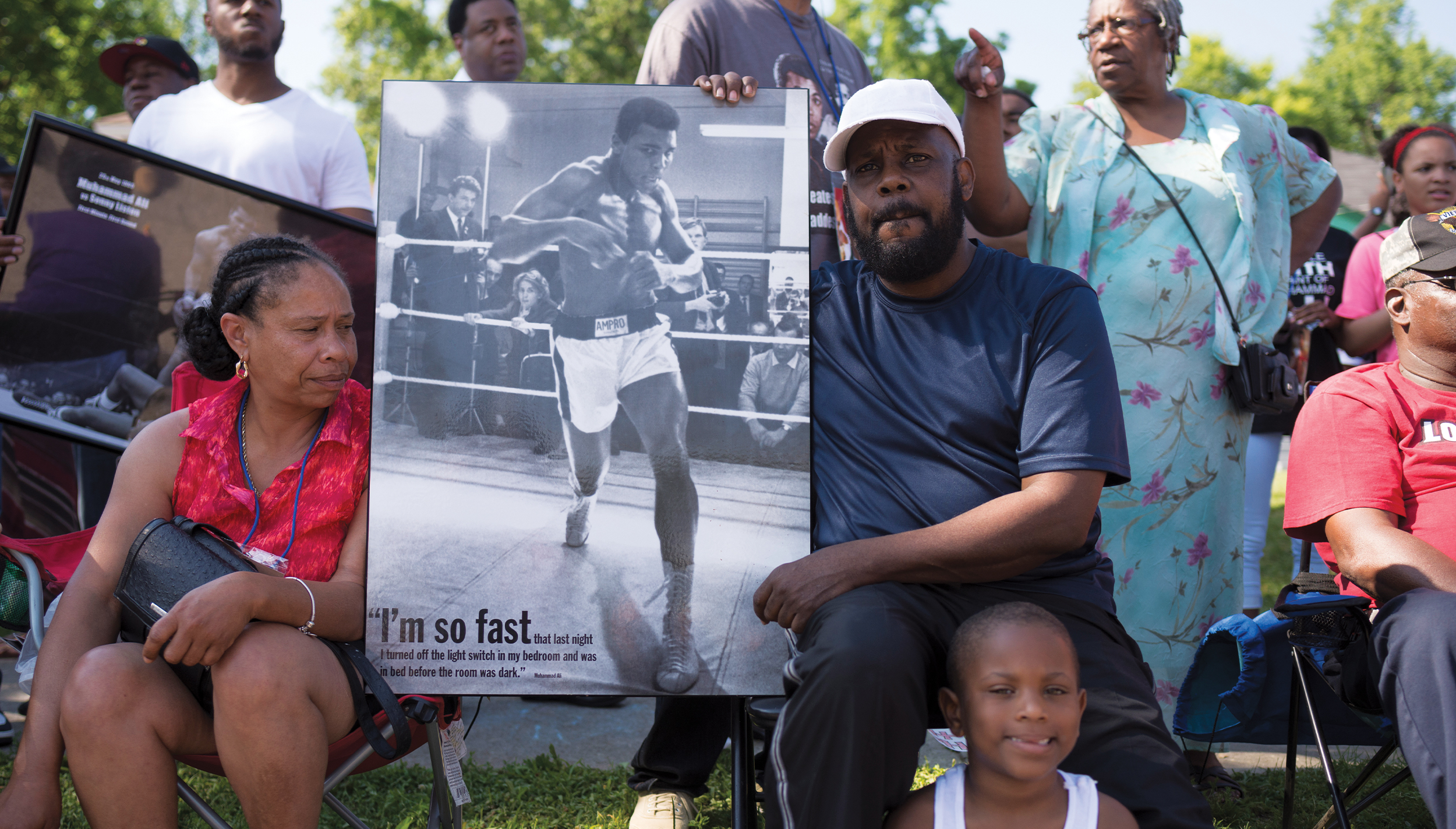
CHAMPION
TORI MURDEN MCCLURE
Spalding University President
“W ell, it was commencement weekend for us, which is a busy time, and Friday evening I received word that things were not good. We were having a reception for our honorary-degree recipients, and we did a moment of silence for Muhammad. Saturday morning I got up and read the paper. And I was fine, sort of kept it together, like, It’s commencement, I have to keep it together. I got in the car to drive to the place where we were having the commencement ceremony and I just lost it. And I cried all the way. We do it at Canaan Christian church, and I cried all the way to Canaan. So I just sat in the car and had to pull it together and went inside. There were lots of folks who knew I had worked for Muhammad and was the first full-time employee of the Ali Center. I was someone he pushed around in a playful kind of way. Folks that morning were trying to steer clear of me, because every time somebody said, ‘I’m sorry,’ I was like, ooh, not now. Just trying to keep it together. So I chucked my commencement address, which I had worked on for quite some time, and talked about Muhammad Ali and his connection to Spalding and how he had boxed in the Columbia Gym (now the University Center) and how he worked in our library.
“Sunday morning I got up and just felt the need to do something to honor Muhammad. My husband Mac has a daughter named Clay. Clay’s in her 30s, and Mac still had Clay’s bicycle from when she was a child up in the garage. It was a red Schwinn bike. I was dragging the bike down the stairs and it was covered in cobwebs and mud dauber nests, and there was this clang clang clang going down the stairs. It was this bar that you use to turn a girl’s bicycle into a boy’s bicycle. Only my husband would save a bike from 20 years ago and have the bar still. I put the bar on it and brought it to campus and put a bunch of blue and yellow ribbons on it because those are Spalding’s colors. I climbed out on the roof on the University Center building and I was busy trying to hang it up on the side of the building when a campus safety officer rode by on his bike and he looked up and said, ‘Oh, it’s just Tori,’ and he kept riding by. I got it all situated and went home and didn’t think anything about it. I deliberately didn’t try to put any kind of sign saying what the bike meant. Within a day or two, the pictures of the bicycle started to go viral. I was really shocked, because how many people would know about the red-bicycle story?” (In case you don’t know the story: Somebody stole Ali’s red Schwinn bicycle when he was a boy. When Ali, then known as Cassius Clay, told a police officer he wanted to “whup” the thief, the officer, who trained boxers, told the boy he should learn how to fight first. — Ed.)
“I had to leave town Friday morning to give a speech. We had sent out students with the Spalding flag to be there as the motorcade came by. I waited as long as possible to see Muhammad’s procession go by. I waited and waited, and I had to go catch an airplane. Then, when I was giving the speech — it was in North Carolina — I was angry that I did. If the organizers hadn’t been so grateful…I felt like I should have canceled and gone to the service.
“Muhammad knew better than I did what it was like to fail on a worldwide stage. He’d just come by and give me a nudge every now and then like, ‘Kid, you gotta get up again. Can’t lie down.’ We were working on the Ali Center one afternoon with some consultants. Muhammad got bored and asked if he could leave and Lonnie said OK. So he and (biographer) Howard Bingham sort of went trotting off, and I was dispatched sometime later to go find them. We were in the Galt House somewhere and, sure enough, I found Muhammad devouring a plate of fried chicken. I was like, ‘Muhammad!’ He was like, ‘Don’t tell Lonnie.’ He invited me to sit down, and we got into this conversation, back and forth, and I told him that there were a couple other women who were thinking about rowing across the ocean. He said, ‘Tori, you don’t want to go through life as the woman who almost rowed across the Atlantic.’ I probably would have gone anyway, but having Muhammad Ali as your excuse was a pretty good one.
“Muhammad was one of the most viscerally compassionate human beings I’ve ever met. And I’ve thought about that quite a bit. Spalding was declared a compassionate university and I’ve had the opportunity to become friends with Karen Armstrong, who was one of the principal authors of the Charter for Compassion. The Dalai Lama and Desmond Tutu signed onto the charter. I adore Karen Armstrong, but she gets compassion intellectually; she doesn’t get compassion in her heart. She and I are very much alike. If an introvert’s a zero and an extrovert’s a 10, I’d be about a 1; Karen Armstrong would be about a minus-12. Muhammad would be, I don’t know, a 50. Muhammad just had this sort of emanating magic of compassion, and he didn’t care who you were or where you came from. He knew that you had your own hurts and pains.”
— MCA
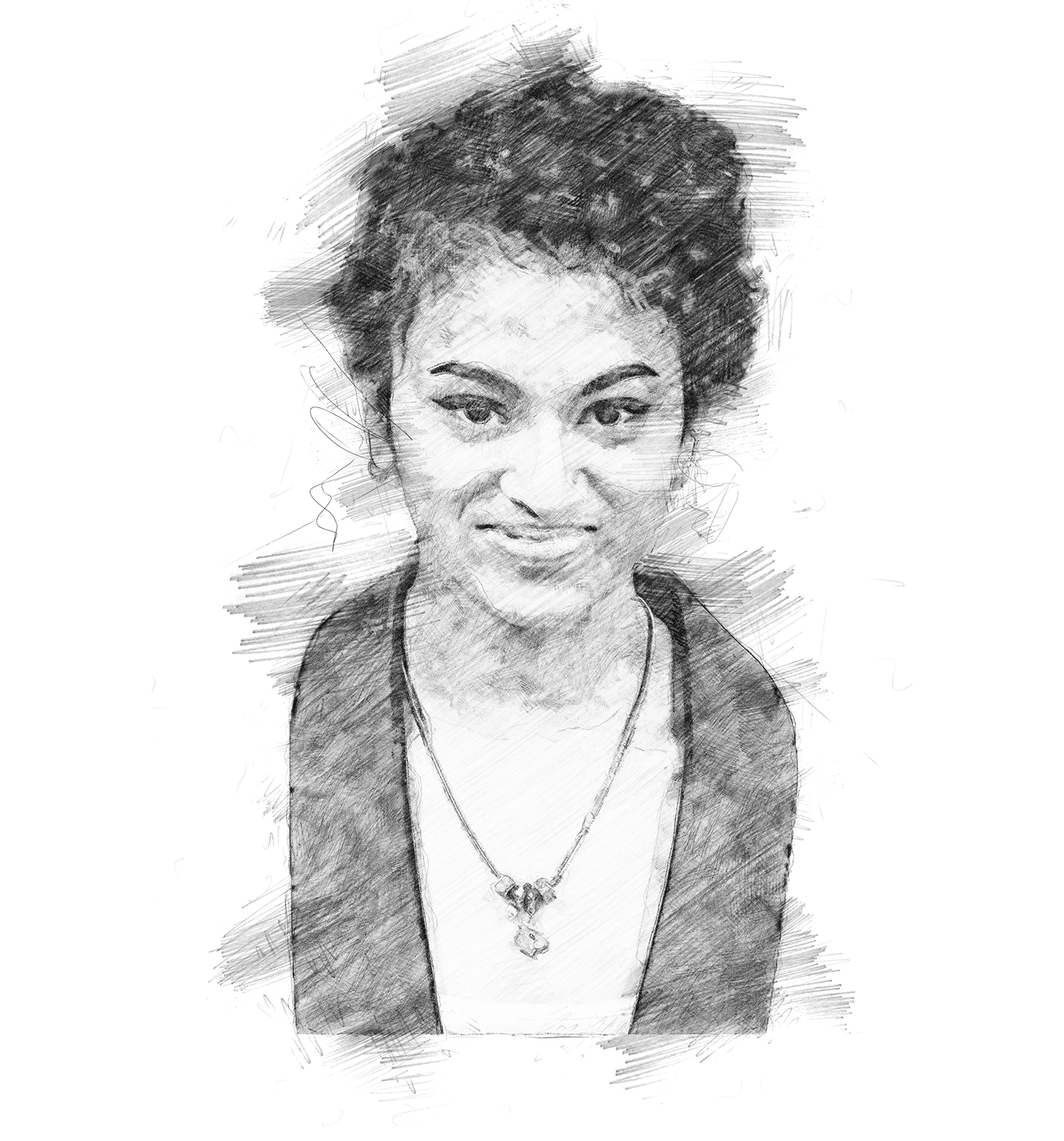
SPEAKER
NATASHA MUNDKUR
She walks to the podium, elegant in a black dress and navy blazer, her black curly hair neatly draping one shoulder, her delicate features and dark eyes resting in a solemn, thoughtful state. Millions are listening and watching the eulogies for Ali. She speaks, her voice a bit shaky. Before I begin, I would like to say I’m truly honored and humbled to be here. Natasha Mundkur’s not nervous. All the 19-year-old University of Louisville student can think about are her too-tight shoes that have left her feet aching and bleeding.
She looks at her speech, then out to the audience, which exists in a dark abyss behind bright lights. So let me tell you a story about a man. She can make out Lonnie Ali and Muhammad’s kids in the front rows. A man who refused to believe that reality was limitation to achieve the impossible. Mundkur first learned of Ali — his boldness and tenacity — in an elementary school civil-rights lesson. A man who once reached up through the pages of a textbook to touch the heart of an eight-year-old girl.
A fly in a milk carton — that’s how Mundkur describes her childhood in rural Virginia. A girl whose reflection of herself mirrored those who could not see past the color of her skin. Kids saw her brown face and Indian heritage as unwelcome, even once throwing rocks at her. At the podium, tiny gasps of air, like soft hiccups, escape with each word. It’s OK to get emotional, she tells herself. It’s true to the moment. But instead of drawing on the pain from that distorted reality, found strength, just as this man did who stood tall in the face of pelting rain and shouted, ‘I am the disturbance in the sea of your complacency and will never stop shaking your waves!’ The crowd roars. She picked up those rocks that were thrown at her and she threw them back. Mundkur covers her mouth, choking back tears. Lonnie Ali mouths, “It’s OK.” For the rest of Mundkur’s life, this will remain the clearest memory of her five minutes onstage.
She continues. Impossible is not a fact. Impossible is an opinion. Impossible is nothing. Mundkur was asked to speak about Ali earlier in the week. She’s well-known at the Ali Center, having participated in youth programs there once her family moved to Louisville from Virginia. When I look into this crowd, I smile. I smile to recognize that he is not really gone. As of last night, she hadn’t even written the speech. Every time she’d try, she’d crumple into sobs. Finally, with the help of a pizza and a close friend who’s skilled in debate, she wrote thoughts down in her personal journal. Within an hour, she had her speech. He lives in you and he lives in me and he lives in every person he has touched in every corner of this world. Impossible is never enough to knock us down because we are Ali.
What a week this has been for Mundkur. She’s done interviews for Indian and British media. In the days to come, she’ll receive 2,000 Facebook friend requests. In the months to come, her speech will be viewed on YouTube more than 130,000 times. So let me tell you about a man. His name is Muhammad Ali. He is the greatest of all time. Ali taught her not to doubt the power of her own voice. He is from Louisville, Kentucky, and he lives in each and every one of us. And his story is far from over. Mundkur wipes tears and pauses for her standing ovation.
— AM
BEEKEEPER
KEVIN MCKINNEY
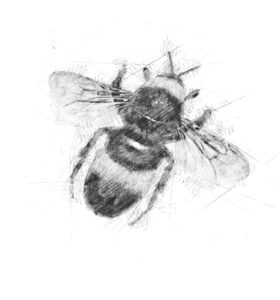
Two days after Ali died, on Sunday, June 5, a text message from a Louisville Metro government employee woke Kevin McKinney at about 8:30 in the morning. Bees at the Belvedere. McKinney, a beekeeper with the Kentucky Beekeepers Association, receives such texts when the KBA has a request for swarm removal. McKinney headed downtown with protective gear, a hive box and no idea the insects — their placement and timing — would cause goosebumps and international headlines.
The honeybees, about 15,000-strong, had gathered on a small tree facing the Muhammad Ali Center and standing just a few feet from a large Ali mural with his most famous quote — Float like a butterfly, sting like a bee. As McKinney lured the queen bee and her followers into the box, reporters did the swarming. “It was a bit of a fiasco,” McKinney recalls. “I am shaking bees off the tree and there are thousands of bees flying in the air. I had to say, ‘Can you get those cameras out of my face?’” News of the bees spread quickly, even nabbing coverage on the BBC. “Some people thought someone maybe put the bees there,” McKinney says with a chuckle. “I find that pretty funny because you can’t just dump bees out and expect them to stay in one spot.”
Was it coincidence? A message from the Greatest? “It’s either odd or God,” one man told WDRB news. Consider this: Upon successfully removing the hive, McKinney inspected the amount of wax left behind on the tree. It seemed to suggest the bees arrived on June 3 — the day Ali died.
— AM
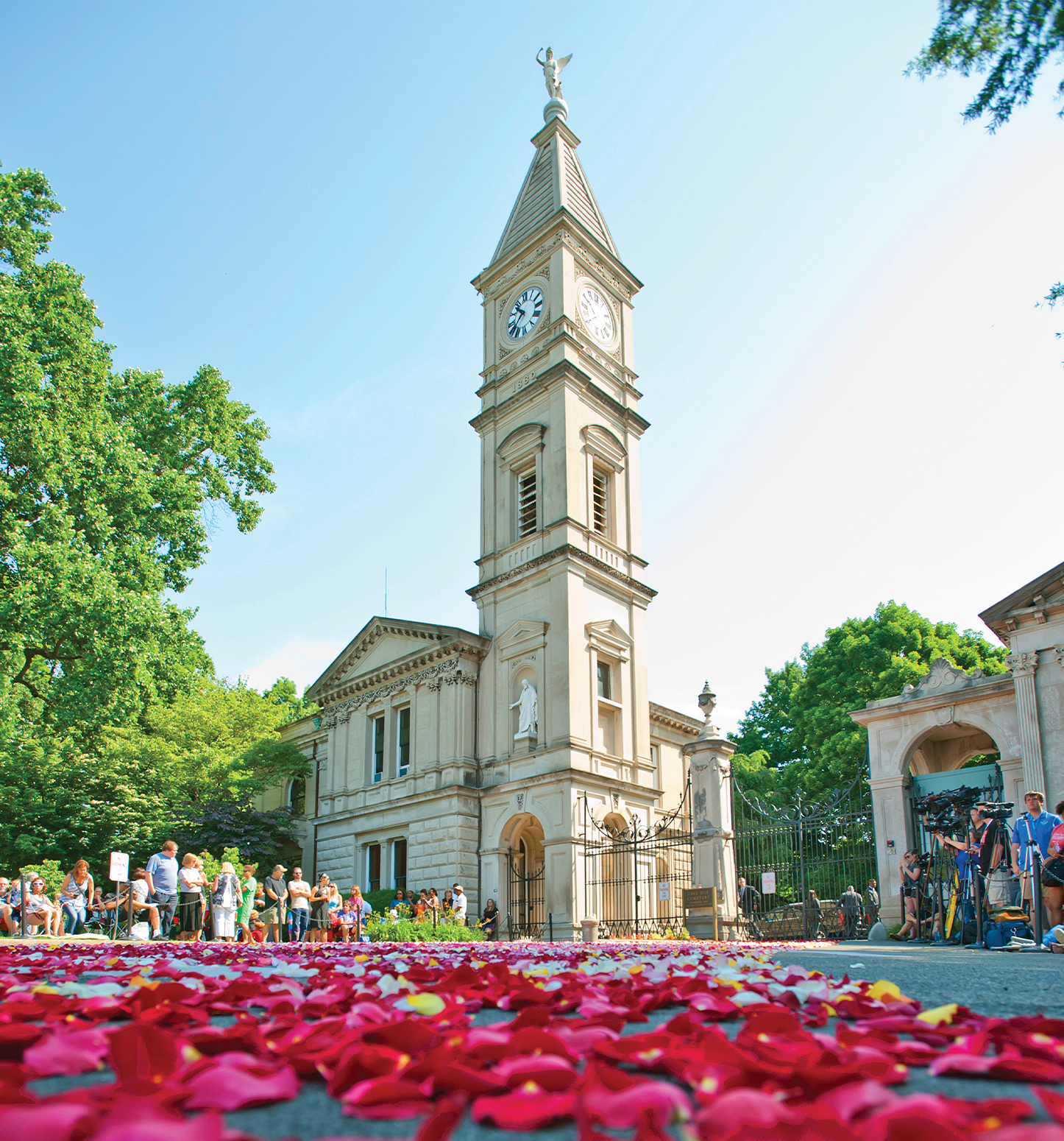
ARTIST
MAGGIE CASSARO
The night after Ali died, Maggie Cassaro and her former classmate spread the petals of a dozen roses across the steps of the Ali Center. The next morning, the petals remained. Cassaro watched as a woman approached the stairs, lifting and dropping a foot at the bottom. “It was like she didn’t know whether to go forward,” Cassaro says. “She started walking, but so gently. I realized that perhaps in her mind she was walking on hallowed ground.”
The day of Ali’s funeral, Cassaro dropped nearly 90,000 rose petals over the entrance to Cave Hill Cemetery. Eddie Kraft, owner of Nanz and Kraft, contacted every flower distributor within 100 miles. ValuMarket provided roses and assistance. Bags of petals overflowed in Cassaro’s living room and basement. “One person could never accomplish anything like that alone,” she says. (Bob Gunnell, owner of Boxcar PR, said that Lonnie Ali cried when she heard about Cassaro’s proposal.)
“I knew of no finer way to pay tribute than to kiss Muhammad Ali in his final farewell. As each rose petal fell from my fingers it felt as though I was blowing him a kiss,” Cassaro says.
Cave Hill told Cassaro that they wanted the petals to remain as long as possible, a physical reminder of Ali and the hallowed ground. But after the hearse passed over the bed of petals, spectators began to collect them. “There were so many people touched by Ali that they wanted to take a piece home with them,” Cassaro says.
— JK
THE MAYOR’S OFFICE
JEAN PORTER
deputy director of communications
CHRIS POYNTER
director of communications
Jean Porter: “I actually was going to a fundraiser at the Ali Center that Friday night that started at 6 and I knew when I left (for the fundraiser) that it was imminent. In fact, I said to Chris, ‘If you find out, call me because I’d like to tell the people who are there.’ It was a church kind of fundraiser, and I knew they’d want to do something or say something. My son did the opening benediction and he mentioned, ‘In case you hadn’t heard…’ He did this beautiful prayer. Here we are praying for Ali in his last moments. I knew it was possible that it had already happened.
“Saturday morning after the flag (lowering) ceremony, the mayor went over to the Ali Center for another press conference and we walked over there with him. It struck us, and then the mayor reinforced this: the people who work at the Ali Center have lost a family member. Ali would come there, he had a little office with his own recliner where he would sit; he’d go through the place. Even though all of us knew he was going to die, it was still a shock. I think the community had gotten to the point where they just didn’t believe that he ever would die.”
Chris Poynter: “We had been planning for a pretty short funeral, a couple days, so we had a really good public safety plan around that, and when Muhammad Ali died and we realized it turned into an entire week, suddenly we had to flip to a communications plan. There’s no website where you can go to find out about all things Ali. There was a website for the Ali Center, a website for boxing — but nothing about Ali in Louisville. We pulled the team together and launched the site in less than 24 hours. You had to sort of feed a weeklong series of events to the media.”
JP: “And then have it not just be a national thing but international. We knew we’d get some global press, but they were here from Japan and Ireland and China and Bangladesh.”
CP: “Ali loved kids. If you’ve ever seen him around kids, he just had this natural thing. I was on the phone at like 6:30 Sunday morning. I just blurted out, ‘Well, let’s have an I Am Ali festival.’ I didn’t even know what that meant. No matter what we asked of the community, everybody dropped everything and worked together, whether it was arts groups or the Kentucky Center, which gave us the space for free.”
JP: “They were like, ‘OK, you can have it till 4 o’clock and then you gotta be gone because the show starts.’ I think it was Phantom of the Opera. It was amazing that it came together like it did.”
CP: “We were talking early in the week about the procession. We were like, is anybody going to show up? Nobody really knew until the hearse turned onto Bardstown Road. Obviously lots of people showed up. We thought: What is Louisville going to look like on national TV that entire route? LMPD, Public Works — we all drove the route and we literally said, ‘That lot needs to be cut, that building needs to be painted, that graffiti needs to be removed.’ Whatever we asked about, people just did it.
“When we created the website, we realized, if you’re a visitor you may not know about it. We had these little business cards that our graphic designer Priscilla did in like an hour. I said, ‘We gotta have 5,000 of these.’ So she called the printer and they were like, ‘We’re not going to be able to get to it until next week.’ Priscilla said, ‘Well, this is for Ali,’ and he dropped everything. We had the cards that afternoon.
“We’ve said this and Lonnie has said this: It’s almost like the hand of Muhammad Ali was working invisibly from the heavens. Because even the little things that happened that week, it was like, did that just really happen?
“We had been searching for any descendants of the guy who taught Ali to box at what is now Spalding (formerly the Columbia Gym) — a Louisville police officer, Joe Martin. We wanted to invite them to the funeral, wherever in the world they were. We couldn’t find any. The Ali family had looked. Ali Center had looked. I had looked. Monday I picked up the paper and there was a story by Tim Sullivan about the granddaughter and she lives over in Crescent Hill! I mean, we thought his family had been long gone. I called Tim from the gym at like 5:30 in the morning, like, ‘I need that girl’s number.’ She was getting ready to go to work and we said, ‘We want to introduce you to the world as Joe Martin’s descendent, can you be at the Ali Center in one hour?’
“And the boyhood home. It’s like, did he plan this? Because a few weeks before, we were down there for the ribbon cutting. It was weird how things fell into place so easily that week.”
JP: “I actually had already planned a vacation and I left town on Friday, the morning of the funeral. My husband had snuck his phone out on the airplane. We were watching the motorcade come down Ninth Street off of 64 and you could hear people shouting, ‘I am Ali.’ We were in tears on the plane. We stayed with my aunt and uncle in Jacksonville and I asked them to DVR it. I remember it was raining in Florida and we just sat in a dark room and watched the whole thing. I teared up when I saw the processional come down Ninth Street. I was proud.”
CP: “I was inside the cemetery at the front gate waiting for the hearse to arrive. I had gotten there early and (artist) Maggie (Cassaro) was putting out the rose petals. I took out my phone to take a video of her. I just posted the thing on social media and it had like 2.5 million views within like two hours. I was at Cave Hill watching the procession on the TV, waiting for the hearse to arrive. When I saw that little kid shadow box, that was pretty amazing.
“We got the hearse in. We got the family in. They went back to the grave and then the crowd started to dissipate. I looked down and — you know at the entrance of Cave Hill there’s a guard shack? Every day they have a list of burials and what time they’re coming in. Usually there are like six or seven names. There was just one sheet that read: Muhammad Ali. It was like, wow. Actually I have that paper. The cemetery gave it to me.
“You know what else happened that week that was pretty amazing? There was not a single homicide that week. That week we had no significant crime issues. When I was sitting in the Yum! Center for the funeral, I realized this is taking on a global message here. This has moved beyond Muhammad Ali. Watching that service 20 years down the road with the context of history, what was said that day, I think that will stand the test of time.”
JP: “Especially in this year. There weren’t politics, there were no murders. In this year of being so divisive on every front, it was just a breather from all that and I think that’s why it wasn’t so sad as much as it was inspiring.”
— MCA
THE BURIAL
CAVE HILL CEMETERY
It was a tectonic undertaking, The Champ. His wife had bought the plot near the lake eight years ago and instructed everyone to keep it secret. Only it is impossible to bury a giant in secret. When Muhammad Ali died, Cave Hill Cemetery president Gwen Mooney found her phone had exploded with calls, texts, emails. At least 50 media requests. She said nothing, as did the rest of the staff. There was still a lot they didn’t know. Would Ali be interred the following day, per Muslim tradition? Cave Hill Heritage Foundation manager Michael Higgs stashed a suit in his car so he could be ready at any moment. Turned out the burial would not take place for a few days. The internment crew didn’t even know where the grave would be until shortly before they broke earth.
Despite the silence, they came. Reporters, photographers, pilgrims. They climbed over the walls at night, hunkered in bushes, tried to sneak cameras through the gates in the back seats of their cars. Security put up screens to keep lenses from peering inside. The Ali family rented a big tent to go over the grave, attracting more attention. Two reporters sat on a bench in the garden where people scatter the ashes of their loved ones across from the gravesite as Mooney surveyed the place with a member of the Cave Hill Board of Directors, telling him details about the service, where Ali would rest. The next day, a British newspaper printed their conversation. “Almost verbatim,” she says. She’s sure the reporters had bugged the tent. She knew then they’d have to close the cemetery for Ali’s funeral.
Normally it takes two men to dig a grave, but the day before Ali’s service, the entire seven-man internment crew went out to the gravesite to take turns on the backhoe, though one of them was new to the equipment, and had only worked at the cemetery for about seven months. He’d kept a log of all the graves he’d dug, and he scribbled Ali’s information down in the little notebook he carried, the marks describing the resting place of the heavyweight champion of the world as small as all the others — already more than 100 — on the page. The whole crew wanted to contribute to the geological event of shifting Ali from above ground to below. They dug the grave a little wider than usual.
The hot, sunny day of the service, those with tattoos wore long sleeves out of respect, and they waited outside the gates as police completed a sweep of the cemetery with dogs. The procession bled down the road toward the site, and security helped the Ali family up the hill. Then the internment crew lowered Ali down and down. Pallbearers and family filled in most of the grave. The internment crew stayed behind to fill in the rest. A helicopter chopped through the no-flyover rule police had instated. One of the guys on the internment crew thought he could hit it with a well-aimed rock. The CIA helped discourage limo drivers from snapping pics. Mooney told the overnight guards who would protect Ali’s grave for about a month to make sure no one tried to dig up and steal the dirt.
Like an earthquake, Ali reconfigured the cemetery. Management decided to redirect their maintenance route away from his grave, building a new road, and made the road to Ali’s grave one-way to ease traffic, painting it with a green line to lead the 100 or so visitors per day to the monument. There, fans leave photos, flags, boxing gloves, even a rocking chair. The Cave Hill horticulturist kept the plants people left and nourished them in the greenhouse until they could be replanted at the grave. Cave Hill has saved everything, just as the Ali family asked. “Enough to fill about half this room,” Mooney says in her accommodating office. “We go through the grave every day to make sure the items people leave don’t disappear.”
— DJ
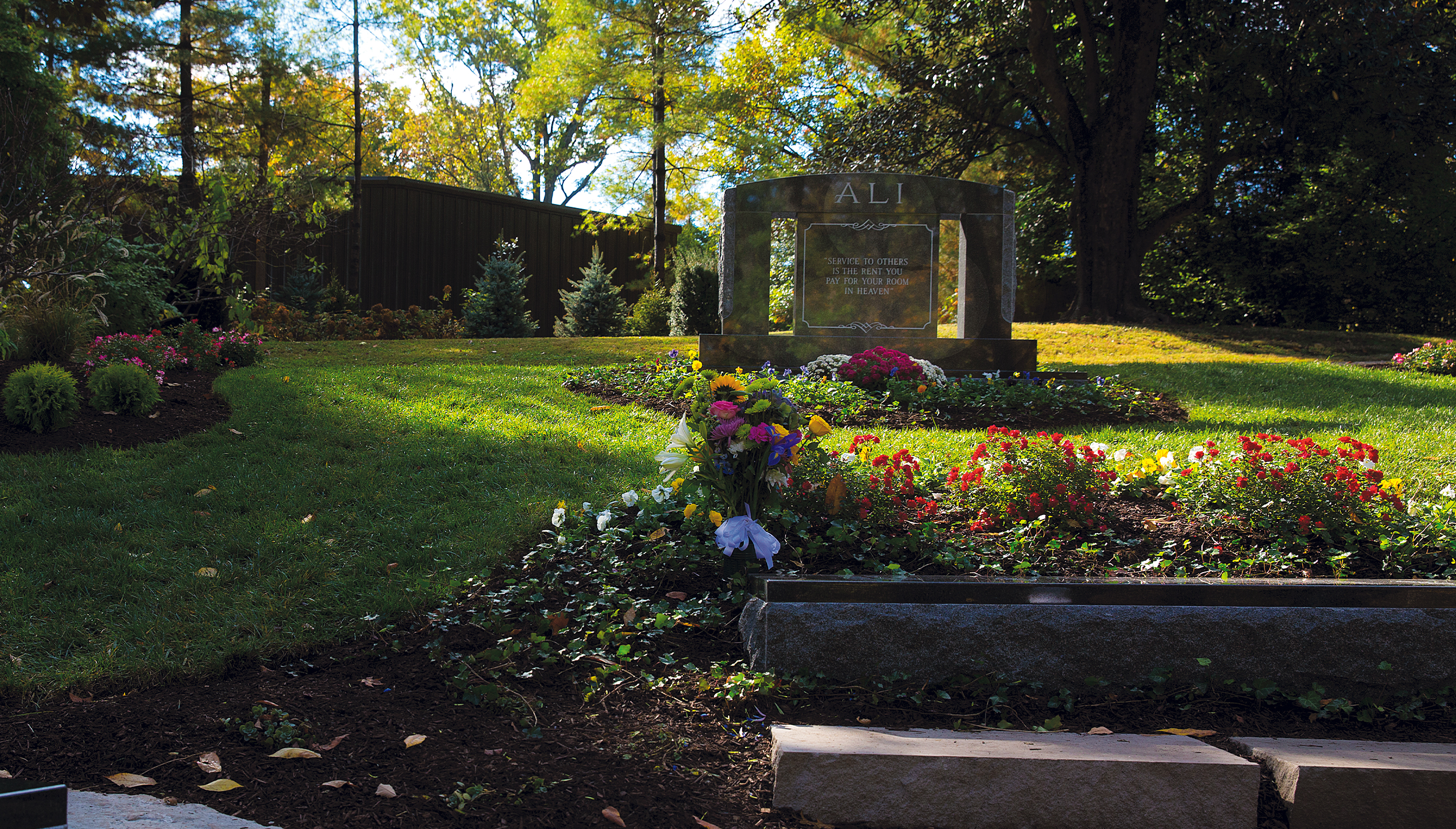
PREACHER
THE REV. KEVIN COSBY
St. Stephen Church
“About eight years ago, I was vacationing with my family at Disney World and I got a phone call from Lonnie Ali, and she said that, in the event that Muhammad passes, we want you to be one of the eulogists. When she said it, I was thinking it was something imminent, that he was ill. She said, ‘No, but we know that it is inevitable.’
“The reason they selected me is because I eulogized his mother, Odessa Clay, at St. Stephen Church and he was there. My eulogy for Odessa was: from the root to the fruit. I explained how the fruit is visible — he was the fruit — but the root — Odessa, his mother — is underground, so we don’t see the root that produced the fruit. And as I explained that during the funeral, he stood up in affirmation and applause, which was one of the greatest honors of my life. Over the years, I would go to his mother’s house, and Muhammad and I would talk, mostly about discipline, what it takes to be great.
“The thesis of my message about Ali was he helped like no other figure in American history to get black people to celebrate their somebodiness. (From the eulogy: “Before James Brown said, ‘I’m black and I’m proud,’ Muhammad Ali said, ‘I’m black and I’m pretty.’ ‘Black and pretty’ was an oxymoron.” — Ed.) What I wanted to communicate was the radical Muhammad Ali. And that not only was he from Louisville, but west Louisville. To a great degree we have domesticated Ali. We have made him a convenient hero. We call him a transcendent figure, which is true. People of all cultures, of all religions, of all races, have an affinity with Ali because he exhibited universal traits and values — conviction, courage, endurance, the ability not to internalize self-pity — that all people who are great embrace regardless of culture, religion or race. But while he is transcendent, he is a product of black pain, black suffering and the black resistance against the evils of white supremacy. To forget that is to be dishonest. Some people like the fruit but don’t accept the root. The same eulogy I gave for his mother. My objective was to show what it was that gave birth to Muhammad Ali — the suffering and pain of black people — in hopes that America might ask: In this day of Black Lives Matter and Ferguson, Missouri, and Baltimore and Freddie Gray — have we changed? The conclusion depends on how honest people want to be. When you’re celebrating the best it makes you behave at your best. But the murder rate the same year we celebrated Muhammad Ali is at an all-time high in west Louisville. That means that feel-good clichés are not enough. To truly advance Ali’s agenda requires systemic and structural change.
“While delivering the eulogy from the stage, I could only see the first three rows because of the lights. When I said, ‘You can’t place a bet on a horse in the Kentucky Derby when it’s already in the winner’s circle; you have to bet with the horse when it’s still in the mud,’ I’ll never forget: Bill Clinton fell out. That’s one thing I’ll never forget, that Bill Clinton lost it, like I had just jabbed him like Ali. Bill Clinton came up to me after he finished his eulogy and whispered in my ear, ‘You were amazing.’”
— JM
SECURITY
JIM CAIN
Cain is the retired chief of executive protection in the mayor’s office and director of security during Ali week.
“Bob Gunnel from Boxcar PR was saying someone from Louisville Magazine wants to talk to you. I said: What do they want to know? How much I sweat during the week? How much sleep I got — which was very little, by the way. There were a couple 18-, 19-hour days.
“Bomb sweeps, metal detectors. You do everything — but at every location. Imagine doing a bomb sweep at Yum!, at the Fair and Exposition Center. We had the funeral home, the Ali Center, the airport. You have to advance all those locations. Cave Hill Cemetery. Think about how massive that area is. We had to literally shut it down. There was coordination with Louisville police, Kentucky state police, the Secret Service, the bodyguards for the stars that came to town. You name it, you had to plan for it. The bigger the better as far as Muhammad was concerned. He wanted it to be a grand occurrence.
“My biggest moment was the procession. The anxiety of knowing you gotta roll though maybe half a million people who are lined up along the 17-mile route. We had extra cars. Little things like, OK, what happens if the limo breaks down? So we set limos out in strategic locations. I was in the lead SUV with Bob Gunnel. We controlled the pace. They had police lined up. We also had plain-clothed officers out there working the crowd.
“Lonnie wanted to stop for a few seconds in front of the house — if it was safe for the crowd and the family. She always referred it back to me: ‘If it’s safe, Jim.’ Of course, I wasn’t too crazy about the idea. We did everything to make sure it was OK. I talked to Major Kelly Jones: ‘Give me your opinion and have the commander down there give me their opinion of a 15-, 30-second stop.’ Lots of it is just sheer intuition, but you gain on experience of being around crowds and if they’re respectful — and they were totally respectful. I felt good the whole week.
“As we approached I said, ‘One last check, Kelly, how we doin’ out there?’ He said, ‘Crowd’s OK. We got it under control.’ If it got bad, we would simply increase the speed of the procession, but obviously we didn’t want to do that because we wanted everybody to kind of take it in. The entire 17 miles, I never felt any kind of anxiety. Matter of fact, it was the opposite — wanting to slow it down and let everyone take it in. At the house, we stopped for 15, 20 seconds and of course the crowds came in a little bit and I’m sittin’ there looking at my watch and I’m watching the crowd and I got back on the police radio and I said, ‘OK, Kelly. Let’s go.’ I guess from an optics standpoint, it really looked good. Everybody said, ‘Man, that was so cool that he stopped like that.’ I thought maybe we didn’t stop long enough.
“When it was all over, I could definitely feel the stress leaving my body like a big weight was lifted off. I wanted things to be so perfect for the family and I wanted them to have the experience of a proper send-off for Muhammad. The crowd gave the family the space they needed to mourn the loss of a husband and a father. That was a special part to me.
I just used every piece of knowledge that I had in my 40 years along the way. Everything that I garnished in my career I used in the Ali detail because it all came into play. I retired from working with the mayor on March 31 and have been doing some consulting here and there. I’ve been at the Breeders’ Cup. Just came back from working a quarter horse race in Dallas. On planes, off planes. Let’s just say a lot less stressful than planning a funeral for Muhammad Ali.”
— MCA
NINE-YEAR-OLD BOY
TOBY HUDSON
Hudson played in the Louisville Leopard Percussionists drum circle for the I Am Ali celebration
“He won the championship and when he came back they wouldn’t serve him dinner. He felt like a prize was nothing, so he threw (his medal) in the Ohio River. He was the one that basically started Martin Luther King Jr.’s actions. And (Ali) thought it wasn’t fair that some people get these rights but other people don’t. I have to say, I completely agree with him. I have some friends that are dark-skinned and they are really good friends of mine and I wouldn’t even know them if it weren’t for him, basically.”
— MCA
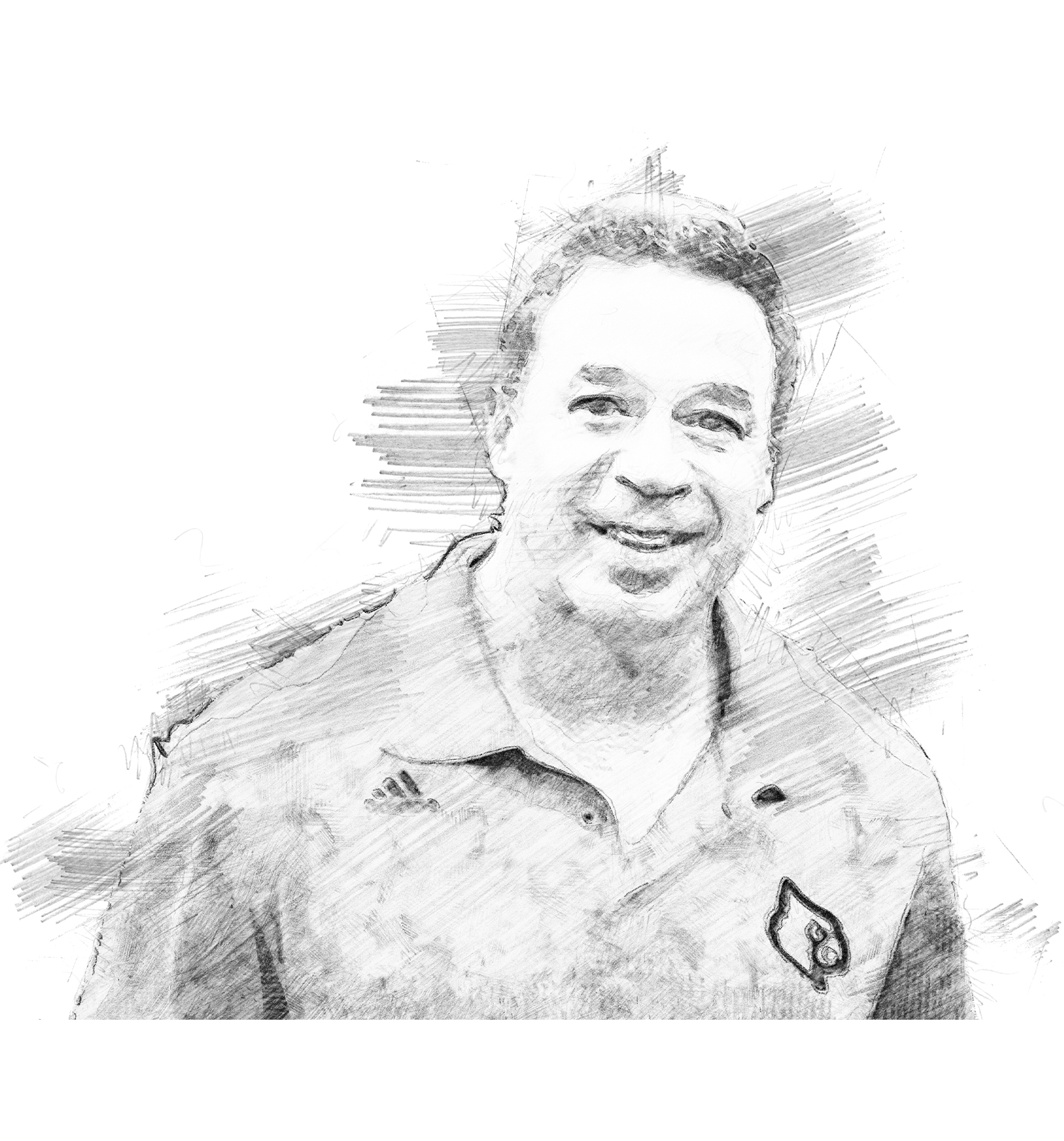
BEST FRIEND
JOHN RAMSEY
sports radio host
“I was in my early 20s — I’m 55 now — and Muhammad was helping former Gov. John Y. Brown run for office. I grew up watching Muhammad fight. I never really had a male figure in my life, so I looked to him as a role model. I always thought I’d get along with him, that he’d like me. Maybe you wish for something so hard it comes true.
“I was dating a girl who got me into a Derby party for Gov. Brown, maybe 100 people. It was at the end of Muhammad’s career but he was still fighting. I remember being so nervous. Eventually, I leaned over to him and did a bad Howard Cosell impression. He said, ‘Howard Cosell gets paid for that, what’s your excuse?’ I’m talking 100 miles an hour, telling Muhammad about Muhammad. He said, ‘Man, you know more about me than me.’ When he left he told me to walk him to his car. It was like a dream. He started throwing punches at me. He said, ‘I like you. I’ll come see you some time, write down your address.’ Three weeks later he shows up at my house. I had this little man cave with all these Ali pictures in it. He told me to call all my friends, to tell them the Greatest was there. They came over and we watched fight films with him. I distinctly remember the room smelled like BO because everyone was so nervous. The friendship took off from there.
“We traveled the world together: England, Ireland, Australia, Canada, all over the U.S. — all on his dime. We’d go to fights, which was like going to church with the pope. Lonnie would always tell us to go out and spend some man time together. We’d put some Marvin Gaye on the CD player and drive around. We’d come home five hours later — midnight or 2 o’clock in the morning — and Lonnie would say, ‘You were on Muhammad time, weren’t you?’ Somebody would meet him and he’d want to sit and talk to them and all the sudden he’s holding court. One time in Atlanta, I’m trying to get him back home to Louisville, and Muhammad’s signing autographs. He goes, ‘John, when’s the next flight? Let’s stay here and make some people happy.’
“I knew he was going into the hospital, but he’d gotten off the mat so many times before. I was flying into New York because my son was getting engaged. Lonnie said, ‘You go be with your son.’ I landed in New York and had a voicemail from Lonnie. I called her up and she was crying. She said, ‘John, you might want to come see your friend.’ I saw my son, gave him a hug and got on another flight. Muhammad gave so much of himself. I think he just gave all that he had. It was time.
“To be honest, I went to Phoenix that time for Lonnie. Because Lonnie gave me the best gift she could have ever given me in April, two months prior. I’d go out once or twice a year to be with Muhammad, watch fight films with him. Back in the day it was going to parties, meeting celebrities — but it wasn’t like that in the end. It was helping him take his meds, getting him to speech therapy. In April, she said, ‘Come on out and see Muhammad.’ I think she knew he wasn’t doing well.
“I’d read to Muhammad. It was always an Ali book. Lonnie and I would laugh because he loved hearing about himself. I always tell people, ‘The only person who liked to watch Muhammad fight more than me was Muhammad.’ I would remind him of quotes he said. In the later years, his mind was sharp. Sometimes he would stop me and would point at a picture. He could very softly say, ‘Read it again.’ In the mornings, after a good night sleep, he was pretty good. We’d get up early and have breakfast. In April, I got to say goodbye to him correctly. I knew he was struggling, that he had lost a lot of weight. I got to look him right in the eye and go, ‘Hey, Champ, I gotta talk to you for a second. Do you know how much you meant to me? How I see you work? How I see what kind of person you are? Thank you for letting me be a part of that.’ He held my hand; he got it. I remember leaving that day and thinking I may not see him again, at least not in good health.
“He had no fear of dying. None. As close as he was to his mom, I remember being nervous getting around him the day she died. All his kids were in town and I wanted to leave him alone and let him grieve. They had just taken the casket out of the church and Muhammad is flirting with my wife, joking around. I talked to him about it, and he said, ‘She’s in a better place.’ But when he said it, he meant it.
“We’d been planning the service for almost nine years, and they told me they wanted me to give a eulogy. I said I’d do it, but I told Muhammad he had to promise me he had 30 years left in him. I put off writing it because I didn’t want to think about it. Because I always thought he’d be OK. I wrote my eulogy on the flight to Phoenix. I was supposed to be the voice of the common man. I could have talked about how great a boxer he was, how great a humanitarian, but, man, he was cool. He had swagger before we knew what swagger was.
“On the flight from Phoenix to Louisville, the imam said, ‘You know, he could have been buried in Mecca.’ When we landed, everybody’s getting ready and Lonnie stood up, she’s pretty soft-spoken, and said, ‘Everybody, sit down. Muhammad gets off first.’ She said, ‘John, you go down and get him off the plane.’ There were some police officers and the imam. They brought the casket down and that was my goodbye to him. I see the helicopters up in the sky. I put my hand on the casket and said, ‘Champ, you’re in Louisville. You’re home, man. This is what you wanted.’
“The day of the funeral, they wanted all the pallbearers — Lennox Lewis, Will Smith, all of us — to meet downtown at the Marriott, in the private dining area at BLU. Somebody said, ‘There’s one pallbearer who’s really upset, can you go up and see him?’ I go up to his room and it’s Mike Tyson. Tyson’s sitting on his bed, rubbing away tears with a towel in his hand. He goes, ‘I was 12 years old, in a detention center, a street kid, and Muhammad came in and made me feel like I could be somebody. The Greatest of all time comes in and tells me I was somebody.’ He was pretty upset, so I started telling him funny Ali stories and before long he’s on the bed kicking like a kid, going, ‘Ooh, you’re making me laugh.’
“During the procession, I was in a car with Will Smith, and almost as soon as we left he put the windows down. And I thought uh-oh. Will said, ‘Muhammad wouldn’t want us in a bubble.’ People would run up, see me, and I’d say you want the other side of the car for Will. As we drove through town, because I know so much historically about Muhammad, I’d tell them stories: This is Grand Avenue where he grew up, this is Chickasaw Park where he’d run.
“At the gravesite, as part of the Muslim burial, there were shovels and a stack of dirt. Mike Tyson, man. It was so hot that day. And they had a plastic tarp over us in case it rained. Tyson took off his jacket and was like, ‘C’mon, let’s go to work.’ So we had a line: shovel, move, shovel, move. He’s down there and we’re burying him. Tyson was getting at it. They had a little station where you could clean off your shoes, and I remember looking at Tyson and he was dripping with sweat.
“I still struggle with it. I hope there’s a time when I can come to peace with it. Maybe it’ll always hit me. It’s just so hard to let him go. Who fills that void?
“I go to Cave Hill often. I’ve probably been seven, eight times since he passed and I’ll probably go again this week. The gravesite is not ostentatious or showy. It’s welcoming: come on in and sit down with me for a while. The last time, I didn’t go out there with this intent, but there’s a new book out on Muhammad, and I just happened to have it in my car. I saw the benches and said, ‘Hey, Muhammad.’ And I got my book out and read to him.”
— JM
Share This Article
We want to hear from you. Who or what should more Louisvillians know about? Share here.